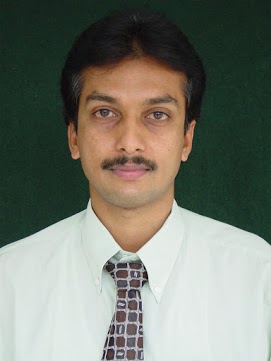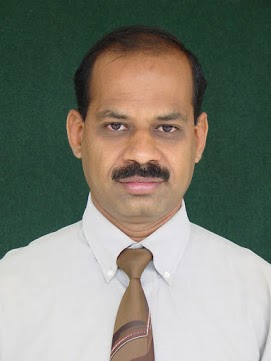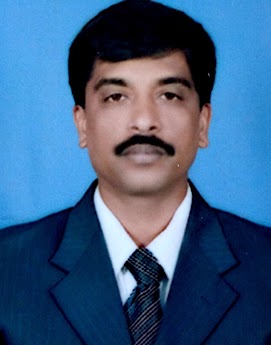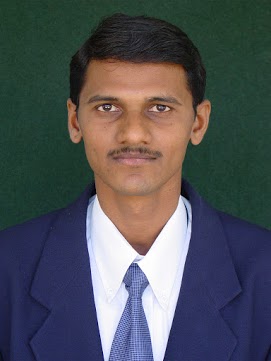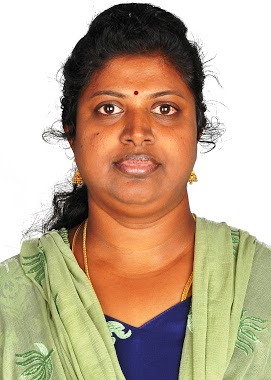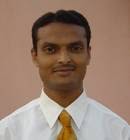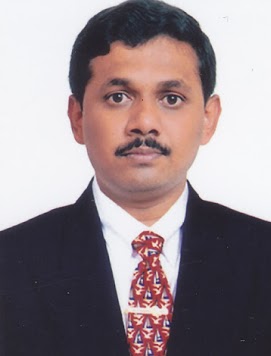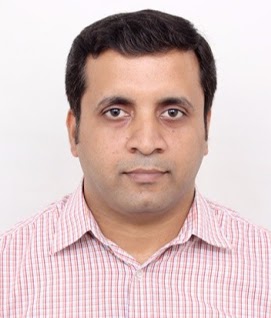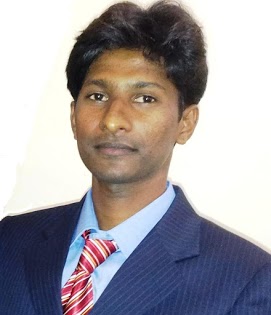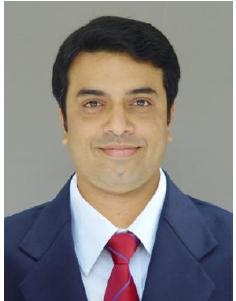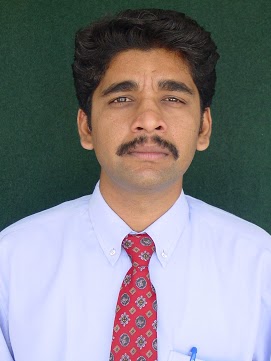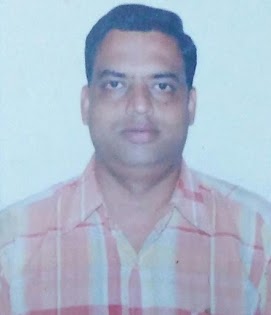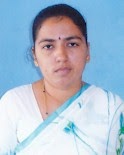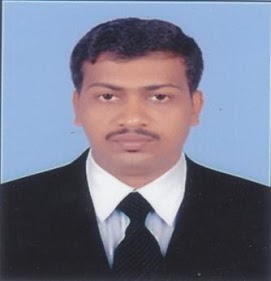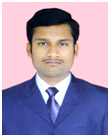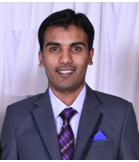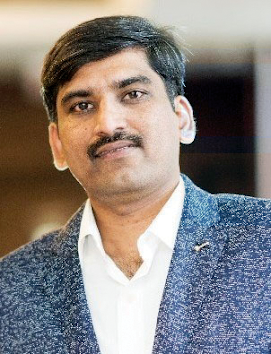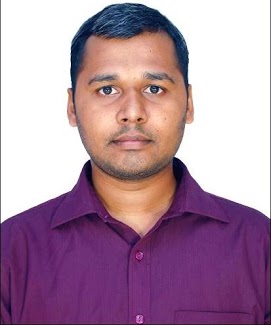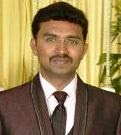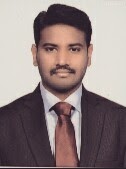Department of Mechanical Engineering was established in the year 1963. Department of Mechanical Engineering is one of the largest and the oldest branches of engineering in the institute. Department has well equipped laboratories, workshops and other infrastructural facilities. Students of mechanical Engineering are exposed to the latest topics in the areas of Design, Manufacturing, Thermal, Material Science and Materials Engineering as per the requirement of the industry. Department of Mechanical Engineering is a recognized Research Centre of Visvesvaraya Technological University for M.Sc. (Engg.) and Ph.D. programmes and also has Post Graduate programme (M. Tech.) in Manufacturing Science and Engineering.
Department Vision |
|---|
To be one of the Premier Centre for technical education and applied Research in Mechanical Engineering and to bring out globally acclaimed competent engineers with innovative ideas and ethical values to fulfil the societal needs. |
Department Mission |
|
|
Program Educational Objectives (PEOs) |
|
|
| Programme Outcomes (POs) |
|
Mechanical Engineering programme is designed to empower the students with the following:
|
Programme Specific Outcomes (PSOs) |
|---|
|
Mechanical Engineering programme is designed to empower the students with the following Programme Specific Outcomes:
|
Short Range Goals |
|---|
|
Long Range Goals |
|---|
|
| Department has the facilities to undertake the following consultancy activities: |
|---|
|
| S Kumaraswamy Computer Operator kumarswamy@sit.ac.in +91 9844119150 D.C.Sc&E Working Area: Hardware/Software and Network Maintenance,Department Work |
|
| Jagadesh Instructor - +91 98864 26906 D.M.E. Working Area: Foundry & Forging |
|
| T R Rajkumar Instructor rajkumartr@yahoo.com +91 94481 53997 D.M.E. Working Area: Energy & Heat Transfer |
|
| N S Mallikarjuna Instructor rsmallik@yahoo.com +91 90367 56062 D.M.E. Working Area: CAD/CAM |
|
| H V Sathishkumar Instructor hvsatish@yahoo.com +91 98442 35695 D.M.E. Working Area: CAD/CAM |
|
| R Prashanth Instructor prashanthrkashyap@yahoo.com +91 98809 81981 D.C.Sc. Working Area: Departmental Work |
|
| Mohan Kumar M Instructor mohankumarm@sit.ac.in +91 7760888832 M.Tech., MBA Working Area: Lab Incharge |
|
| Hemanth Raj M G Instructor hemanthraj@sit.ac.in +91 8792132207 B.E. Working Area: Lab Incharge |
|
| M C Siddalinga Murthy Mechanic - +91 98444 76288 P.U.C. Working Area: Departmental Work |
|
| B H Jagadeesh Kumar Mechanic - +91 96111 46327 D.M.E. Working Area: CAED |
|
| G R Rakesh Mechanic - +91 99809 16555 D.M.E. Working Area: Foundry |
|
| G M Shashidhara Technical Helper - +91 94493 06932 S.S.L.C. Working Area: Fitting |
|
| S H Hanume Gowda Technical Helper - +91 98455 7474 S.S.L.C. Working Area: Carpentary Shop |
|
| K R Sathish Technical Helper - +91 93798 30346 S.S.L.C. Working Area: Foundry |
| Chairman |
|---|
|
Dr. U S Mallik Professor and Head Department of Mechanical Engineering, SIT,Tumakuru - 572103. |
| One expert from outside the college nominated by Vice Chancellor, VTU, Belagavi |
|---|
|
Dr. Shanmuga Nagaraj Professor Department of Mechanical Engineering R V C E, Bengaluru |
| One representative from Industry/ Corporate Sector/ allied area relating to placement |
|---|
|
Mr. Satishkumar Vice-President SANSERA Aerospace Pune, Maharastra |
| Subject Experts from outside the college | ||
|---|---|---|
|
Dr. M R Ramesh Professor Department of Mechanical Engineering NITK Suratkal |
Dr. R Suresh Professor Department of Mechanical Engineering M S Ramaiah University of Applied Sciences, Bengaluru |
|
| Members | ||
|
Dr. B Vasudeva Associate Professor Dept. of Mechanical Engg. SIT, Tumakuru. |
Dr. C Shashishekar Associate Professor Dept. of Mechanical Engg. SIT, Tumakuru. |
Dr. H S Shivashankar Associate Professor Dept. of Mechanical Engg. SIT, Tumakuru. |
|
Dr. Virupaxi Auradi Associate Professor Dept. of Mechanical Engg. SIT, Tumakuru. |
Dr. Shanmuga Priya N Assistant Professor Dept. of Mechanical Engg. SIT, Tumakuru. |
Dr. A G Shivasiddaramaiah Assistant Professor Dept. of Mechanical Engg. SIT, Tumakuru. |
| One Post-Graduate meritorious alumnus | ||
|
Dr. Vivek Assistant Professor IIT, Delhi. |
| Two meritorious student representatives nominated by the HOD as invitees | |||
|---|---|---|---|
|
Ayush Naman 1SI18ME016 VIII Sem Topper |
Tejas N 1SI19ME128 VI Sem Topper |
||
Board of Examiners
| CHAIRMAN |
|---|
|
Dr. A S Poornima Professor & Head, Experience: R & D 14 Years & Teaching 25 Years Dept. of CSE |
| EXTERNAL MEMBERS | ||
|---|---|---|
|
Dr. Yogesh H K Professor & Head Dept. of ISE Experience: R & D 10 Years & Teaching 23 Years MSRIT, Bangalore |
Dr. Naveen N C Professor & Head Dept. of CSE Experience: R & D 15 Years & Teaching 25 Years JSSAT, Bangalore |
Dr. Anandhi R J Professor & Head Dept. of ISE Experience: R & D 14 Years & Teaching 25 Years NHCE, Bangalore |
| INTERNAL MEMBERS | ||
|---|---|---|
|
Dr. N R Sunitha Professor Dept. of CSE Experience: R & D 16 Years & Teaching 25 yeaes SIT, Tumkur |
Dr. R Sumathi Professor Dept. of CSE Experience: R & D 14 Years & Teaching 29 Years SIT, Tumkur |
Dr. Y S Nijagunarya Professor Dept. of CSE Experience: R & D 12 Years & Teaching 33 Years SIT, Tumkur |
|
Dr. K.N.Shreenath Associate Professor Dept. of CSE Experience: R & D 11 Years & Teaching 22 Years SIT, Tumkur |
Dr. M.B. Nirmala Associate Professor Dept. of CSE Experience: R & D 10 Years & Teaching 22 Years SIT, Tumkur |
| Under Graduate | |
|---|---|
| B.E. in Mechanical Engineering | 4 years |
| Post Graduate | |
| M.Tech. in Manufacturing Science and Engineering | 2 years |
| Research | |
| M.Sc. Engineering | - |
| Ph.D. Programme - Ph.D. in Mechanical Engineering | - |
| ( ! ) Warning: include(./component/mechdept/mechgallery.php): failed to open stream: No such file or directory in C:\wamp64\www\sit\html\department.php on line 887 | ||||
|---|---|---|---|---|
| Call Stack | ||||
| # | Time | Memory | Function | Location |
| 1 | 0.0002 | 360824 | {main}( ) | ...\department.php:0 |
| ( ! ) Warning: include(): Failed opening './component/mechdept/mechgallery.php' for inclusion (include_path='.;C:\php\pear') in C:\wamp64\www\sit\html\department.php on line 887 | ||||
|---|---|---|---|---|
| Call Stack | ||||
| # | Time | Memory | Function | Location |
| 1 | 0.0002 | 360824 | {main}( ) | ...\department.php:0 |
| Research Project | Numbers |
|---|
| Research Scholars | Numbers |
|---|---|
| Ph.D. Awarded | 14 |
| Pursuing Ph.D. | 40 |
Academic Year 2019-20
| Name of the Research Scholar: | Vinay C D |
|---|---|
| Research Guide: | Dr. H R Puruhothama |
| Date of Registration: | 2019-04-01 |
| Name of Research Institute University: | VTU, Belagavi |
| Topic of Research : | Investigative Studies on Attaining charge Homoginity in CI-DI Engine |
| Status: | Pursuing Ph.D. |
| Date of Award : | - |
| Name of the Research Scholar: | Vineeth Kumar T. V. |
|---|---|
| Research Guide: | Dr. N Shanmuga Priya |
| Date of Registration: | 2019-07-09 |
| Name of Research Institute University: | VTU, Belagavi |
| Topic of Research : | Studies on Diminution of Revision Surgeries in Cemented Total HIP Replacement. |
| Status: | Pursuing Ph.D. |
| Date of Award : | - |
Academic Year 2018-19
| Name of the Research Scholar: | Sharath Kumar S N |
|---|---|
| Research Guide: | Dr. Harish Kumar, Professor, Dept. of MED, SSIT, Tumkur |
| Date of Registration: | 2019-04-11 |
| Name of Research Institute University: | VTU, Belagavi |
| Topic of Research : | Analysis of heat Transfer and Flow Behaviour for Alluminium Alloy Plate Fin Heat Sink with dimple |
| Status: | Pursuing Ph.D. |
| Date of Award : | - |
| Name of the Research Scholar: | Madhusudhan S V |
|---|---|
| Research Guide: | Dr. G S Shiva Shankar |
| Date of Registration: | 2019-01-10 |
| Name of Research Institute University: | VTU, Belagavi |
| Topic of Research : | Numerical and Experimental Investigation on Energy Absorbing Thin Walled Structures |
| Status: | Pursuing Ph.D. |
| Date of Award : | - |
| Name of the Research Scholar: | Channakeshava Naik |
|---|---|
| Research Guide: | Dr. K S Shashi Shekar |
| Date of Registration: | 2019-01-01 |
| Name of Research Institute University: | VTU, Belagavi |
| Topic of Research : | Design fabrication and Performance Evaluation of Pebble Solar Thermal Collector |
| Status: | Pursuing Ph.D. |
| Date of Award : | - |
| Name of the Research Scholar: | Praveen N |
|---|---|
| Research Guide: | Dr. U S Mallik |
| Date of Registration: | 2019-05-23 |
| Name of Research Institute University: | VTU, Belagavi |
| Topic of Research : | Synthesis of Cu-Al-Mn ternary shape memory alloys and optimization of machinability parameters for CNC machining and wire EDM |
| Status: | Pursuing Ph.D. |
| Date of Award : | - |
Academic Year 2017-18
| Name of the Research Scholar: | Pramod N.S |
|---|---|
| Research Guide: | Dr. Bharath Saikumar |
| Date of Registration: | 2018-01-01 |
| Name of Research Institute University: | VTU, Belagavi |
| Topic of Research : | Design And Development of A Device Store Solar/Wind/Electrical Energy for Prolonged Retrieval |
| Status: | Pursuing Ph.D. |
| Date of Award : | - |
| Name of the Research Scholar: | Nissar Ahmed |
|---|---|
| Research Guide: | Dr. G S Shiva Shankar |
| Date of Registration: | 2018-01-01 |
| Name of Research Institute University: | VTU, Belagavi |
| Topic of Research : | Some studies on Fatigue life and Fracture Toughness of Multilayer Ceramic Nano coating on Hybrid MMC Reinforced with B4C and MoS2 |
| Status: | Pursuing Ph.D. |
| Date of Award : | - |
| Name of the Research Scholar: | Raviteja R. N. |
|---|---|
| Research Guide: | Dr. G S Shiva Shankar |
| Date of Registration: | 2019-01-01 |
| Name of Research Institute University: | VTU, Belagavi |
| Topic of Research : | Study of Microstructure, Mechanical properties and Stress intensity factor of Austenitic stainless steel alloys processed by Multi axial warm forging |
| Status: | Pursuing Ph.D. |
| Date of Award : | - |
| Name of the Research Scholar: | Naresh H |
|---|---|
| Research Guide: | Dr. S Prashantha |
| Date of Registration: | 2017-08-01 |
| Name of Research Institute University: | VTU, Belagavi |
| Topic of Research : | Evaluation of Mechanical Working Characteristics of Nitinol Based Shape Memory Alloys with Ternary Additives |
| Status: | Pursuing Ph.D. |
| Date of Award : | - |
| Name of the Research Scholar: | Veeresha R B |
|---|---|
| Research Guide: | Dr. S Prashantha |
| Date of Registration: | 2017-08-01 |
| Name of Research Institute University: | VTU, Belagavi |
| Topic of Research : | Machining Characterisation of Al881-SiCp Metal matrix Composite through Wire cut Electro Discharge Machining |
| Status: | Pursuing Ph.D. |
| Date of Award : | - |
| Name of the Research Scholar: | C Poornima |
|---|---|
| Research Guide: | Dr. U S Mallik |
| Date of Registration: | 2017-12-20 |
| Name of Research Institute University: | VTU, Belagavi |
| Topic of Research : | Investigation of Variation in Characteristics of Polymeric Materials due to Ageing with Variation in Conditions |
| Status: | Pursuing Ph.D. |
| Date of Award : |
| Name of the Research Scholar: | Lokesh N |
|---|---|
| Research Guide: | Dr. U S Mallik |
| Date of Registration: | 2018-04-01 |
| Name of Research Institute University: | VTU, Belagavi |
| Topic of Research : | Synthesis and Evaluation of Mechanical properties, Tribological properties and Fracture toughness of Cu-Zn-Al shape memory alloys |
| Status: | Pursuing Ph.D. |
| Date of Award : | - |
Academic Year 2016-17
| Name of the Research Scholar: | Girija Bidarimath |
|---|---|
| Research Guide: | Dr. B Vasudeva |
| Date of Registration: | 2017-01-01 |
| Name of Research Institute University: | VTU, Belagavi |
| Topic of Research : | Experimental Evaluation of Machinability aspects of WC-Co Cermet Reinforced AI7075 Metal Matrix Composites |
| Status: | Pursuing Ph.D. |
| Date of Award : | - |
| Name of the Research Scholar: | Sanath Kumar K.H |
|---|---|
| Research Guide: | Dr. G S Shiva Shankar |
| Date of Registration: | 2017-01-01 |
| Name of Research Institute University: | VTU, Belagavi |
| Topic of Research : | Studies on Fatigue strength and Fracture Toughness on Nano Aluminium Hybrid Composites |
| Status: | Pursuing Ph.D. |
| Date of Award : | - |
| Name of the Research Scholar: | Raju Ramaiah |
|---|---|
| Research Guide: | Dr. K S Shashi Shekar |
| Date of Registration: | 2017-01-01 |
| Name of Research Institute University: | VTU, Belagavi |
| Topic of Research : | Solar Thermal Energy Utilization for Medium Temperature Industrial Process Heat Applications |
| Status: | Pursuing Ph.D. |
| Date of Award : | - |
Academic Year 2015-16
| Name of the Research Scholar: | Niranjan Pal |
|---|---|
| Research Guide: | Dr. Bharath Saikumar |
| Date of Registration: | 2016-01-01 |
| Name of Research Institute University: | VTU, Belagavi |
| Topic of Research : | To Design and Fabricate a device to supply a mixture of air and fuel to a combustion chamber |
| Status: | Pursuing Ph.D. |
| Date of Award : | - |
| Name of the Research Scholar: | Srinivas P |
|---|---|
| Research Guide: | Dr. C Shashishekar |
| Date of Registration: | 2016-01-01 |
| Name of Research Institute University: | VTU, Belagavi |
| Topic of Research : | Computerized Tooth Profile Generation, Experimental and Finite Element Analysis of Non Standard Gears |
| Status: | Pursuing Ph.D. |
| Date of Award : | - |
| Name of the Research Scholar: | Suresh Patil G L |
|---|---|
| Research Guide: | Dr. C Shashishekar |
| Date of Registration: | 2016-01-01 |
| Name of Research Institute University: | VTU, Belagavi |
| Topic of Research : | Development and Testing of Asbestos Free Brake friction Material for Automobile Disc Brake |
| Status: | Pursuing Ph.D. |
| Date of Award : | - |
| Name of the Research Scholar: | Sanjay S J |
|---|---|
| Research Guide: | Dr. C Shashishekar |
| Date of Registration: | 2016-01-01 |
| Name of Research Institute University: | VTU, Belagavi |
| Topic of Research : | Fabrication and Analysis of Prosthetic Knee joint using Experimental and Finite Element Technique |
| Status: | Pursuing Ph.D. |
| Date of Award : | - |
| Name of the Research Scholar: | Giridhar S Kukarni |
|---|---|
| Research Guide: | Dr. G S Shiva Shankar |
| Date of Registration: | 2011-06-23 |
| Name of Research Institute University: | VTU, Belagavi |
| Topic of Research : | Synthesis and Characterization of Hybrid FRP Composite for its Tribological and Drilling Process |
| Status: | Ph.D. Awarded |
| Date of Award : | 2019-01-06 |
| Name of the Research Scholar: | Naveen G S |
|---|---|
| Research Guide: | Dr. K S Shashi Shekar |
| Date of Registration: | 2016-01-01 |
| Name of Research Institute University: | VTU, Belagavi |
| Topic of Research : | Theoretical and experimental analysis of the effect of dust accumulation on the performance of solar collectors and its remedies. |
| Status: | Pursuing Ph.D. |
| Date of Award : | - |
| Name of the Research Scholar: | Veeresh B R |
|---|---|
| Research Guide: | Dr. R Suresh |
| Date of Registration: | 2016-01-01 |
| Name of Research Institute University: | VTU, Belagavi |
| Topic of Research : | Optimization of Percentage of alloy content in stainless steel its property evaluation for applying in long term operation of the pressure vessels |
| Status: | Pursuing Ph.D. |
| Date of Award : | - |
| Name of the Research Scholar: | Mamatha K M |
|---|---|
| Research Guide: | Dr. U S Mallik |
| Date of Registration: | 2015-09-25 |
| Name of Research Institute University: | VTU, Belagavi |
| Topic of Research : | Evaluation of Biocompatibility of Cu-Al-Mn Shape Memory Alloys for In-Vivo & In-Vitro Applications |
| Status: | Pursuing Ph.D. |
| Date of Award : | - |
Academic Year 2014-15
| Name of the Research Scholar: | Gopal Krishna U B |
|---|---|
| Research Guide: | Dr. B Vasudeva |
| Date of Registration: | 2015-01-01 |
| Name of Research Institute University: | VTU, Belagavi |
| Topic of Research : | Preparation and Evaluation of Mechanical, Wear properties of AI7075 Reinforced with WC-Co Hybrid Metal Matric Composites |
| Status: | Pursuing Ph.D. |
| Date of Award : | - |
| Name of the Research Scholar: | G.Manjunath Swamy |
|---|---|
| Research Guide: | Dr. Bharath Saikumar |
| Date of Registration: | 2015-01-01 |
| Name of Research Institute University: | VTU, Belagavi |
| Topic of Research : | To Design, Develop and Fabricate a Directional Valve to control Multiple Actuators |
| Status: | Pursuing Ph.D. |
| Date of Award : | - |
| Name of the Research Scholar: | Anil Kumar M M |
|---|---|
| Research Guide: | Dr. R Suresh |
| Date of Registration: | 2015-01-01 |
| Name of Research Institute University: | VTU, Belagavi |
| Topic of Research : | An Investigation on effect of addition of Cu and Al on the mechanical, corrosion and wear properties of austempered ductile iron |
| Status: | Pursuing Ph.D. |
| Date of Award : | - |
| Name of the Research Scholar: | Ranganath Swamy M K |
|---|---|
| Research Guide: | Dr. U S Mallik |
| Date of Registration: | 2014-12-12 |
| Name of Research Institute University: | VTU, Belagavi |
| Topic of Research : | SYNTHESIS AND CHARACTERIZATION OF SHAPE MEMORY POLYMERS |
| Status: | Pursuing Ph.D. |
| Date of Award : | - |
| Name of the Research Scholar: | Bharath V |
|---|---|
| Research Guide: | Dr. Virupaxi Auradi |
| Date of Registration: | 2015-01-01 |
| Name of Research Institute University: | VTU, Belagavi |
| Topic of Research : | Microstructural and Mechanical Characterization of 2014Al reinforced with Al2O3 particulates produced by melt stirring method |
| Status: | Pursuing Ph.D. |
| Date of Award : | - |
Academic Year 2013-14
| Name of the Research Scholar: | Rachan D Shekar |
|---|---|
| Research Guide: | Dr. H R Puruhothama |
| Date of Registration: | 2013-10-28 |
| Name of Research Institute University: | VTU, Belagav |
| Topic of Research : | Experimental Study on Performance , Emission and Combustion charecteristics of Diesel Engine working in Biodiesel-Diesel with the addition of H2 O2 andCombustion Analysis using CFD |
| Status: | Pursuing Ph.D. |
| Date of Award : | - |
| Name of the Research Scholar: | Siddesh Kumar N G |
|---|---|
| Research Guide: | Dr. G S Shiva Shankar |
| Date of Registration: | 2013-07-23 |
| Name of Research Institute University: | VTU, Belagavi |
| Topic of Research : | Investigation on Wear Behaviour and Machining Characteristics of Stir Cast Nano Hybrid Metal Matrix Composites |
| Status: | Ph.D. Awarded |
| Date of Award : | 2018-01-09 |
| Name of the Research Scholar: | Bharath Shekar |
|---|---|
| Research Guide: | Dr. U S Mallik |
| Date of Registration: | 2013-01-01 |
| Name of Research Institute University: | VTU, Belagavi |
| Topic of Research : | CHARACTERIZATION OF SHAPE MEMORY ALLOY FOR ITS FATIGUE BEHAVIOUR WITH THE VARIATIONS IN CONDITIONS |
| Status: | Pursuing Ph.D. |
| Date of Award : | - |
Academic Year 2012-2013
| Name of the Research Scholar: | Raju Jadar |
|---|---|
| Research Guide: | Dr. S R Manohara, Associate Professor, Dept. of Physics, SIT, Tumakuru |
| Date of Registration: | 2012-01-01 |
| Name of Research Institute University: | SIT, Tumakuru, VTU, Belagavi |
| Topic of Research : | Fabrication and performance evaluation of nanotechnology integrated next generation automotive radiator. |
| Status: | Ph.D. Awarded |
| Date of Award : | 2017-01-01 |
Academic Year 2012-13
| Name of the Research Scholar: | Manjunath Gowda M R |
|---|---|
| Research Guide: | Dr. Harish Kumar, Professor, Dept. of MED, SSIT, Tumkur |
| Date of Registration: | 2012-11-01 |
| Name of Research Institute University: | VTU, Belagavi |
| Topic of Research : | Design Modelling and Simulation of a flexible valve lift mechanism for an IC engine |
| Status: | Ph.D. Awarded |
| Date of Award : | 2019-03-18 |
| Name of the Research Scholar: | Manjunath K |
|---|---|
| Research Guide: | Dr. K S Shashi Shekar |
| Date of Registration: | 2013-01-01 |
| Name of Research Institute University: | VTU, Belagavi |
| Topic of Research : | Study of the Effect of Nano Fluids on the Performance of Photovoltaic/Thermal Hybrid Solar Systems |
| Status: | Pursuing Ph.D. |
| Date of Award : | - |
| Name of the Research Scholar: | Omkaresh B R |
|---|---|
| Research Guide: | Dr. R Suresh |
| Date of Registration: | 2013-01-01 |
| Name of Research Institute University: | VTU, Belagavi |
| Topic of Research : | Optimization of biodiesel production from non-edible oil seeds -characterization and performance analysis on ci engine |
| Status: | Pursuing Ph.D. |
| Date of Award : | - |
| Name of the Research Scholar: | Arun S B |
|---|---|
| Research Guide: | Dr. R Suresh |
| Date of Registration: | 2012-01-01 |
| Name of Research Institute University: | VTU, Belagavi |
| Topic of Research : | Production Optimization of Various Biodiesel Using Heterogeneous Catalyst & Their Characterisation & Performance Analysis on Single Cylinder CI Engine |
| Status: | Ph.D. Awarded |
| Date of Award : | 2018-04-09 |
| Name of the Research Scholar: | Rajesh G L |
|---|---|
| Research Guide: | Dr. Virupaxi Auradi |
| Date of Registration: | 2013-01-01 |
| Name of Research Institute University: | VTU, Belagavi |
| Topic of Research : | Preparation and Property Evaluation of B4C particulate reinforced 6061Al matrix composites produced via novel two stage melt stirring method |
| Status: | Pursuing Ph.D. |
| Date of Award : | - |
| Name of the Research Scholar: | Yathish.K.V. |
|---|---|
| Research Guide: | Dr. Jagadamba |
| Date of Registration: | 2013-01-01 |
| Name of Research Institute University: | VTU, Belagavi |
| Topic of Research : | Optimization of Biodiesel Productionproduction Parameters Using Non-Edible Oils |
| Status: | Ph.D. Awarded |
| Date of Award : | 2020-07-03 |
Academic Year 2011-12
| Name of the Research Scholar: | Siddalinga Prasad T. S |
|---|---|
| Research Guide: | Dr. H S Shivashankar |
| Date of Registration: | 2010-10-04 |
| Name of Research Institute University: | VTU, Belagavi |
| Topic of Research : | Characterization and property evaluation of forged cutting tools for different industrial application |
| Status: | Pursuing Ph.D. |
| Date of Award : | - |
| Name of the Research Scholar: | M.S.Rajendra Kumar |
|---|---|
| Research Guide: | Dr. Bharath Saikumar |
| Date of Registration: | 2011-01-01 |
| Name of Research Institute University: | VTU, Belagavi |
| Topic of Research : | Development and Characterization of Graphite-Aluminium Nitride(AIN) reinforced in Al6061 Alloy Hybrid Metal Matrix Composite |
| Status: | Pursuing Ph.D. |
| Date of Award : | - |
| Name of the Research Scholar: | S. Shivakumar |
|---|---|
| Research Guide: | Dr. G S Shiva Shankar |
| Date of Registration: | 2012-02-03 |
| Name of Research Institute University: | VTU, Belagavi |
| Topic of Research : | Analysis and Study of hyper elastic Material for Sealing in Industrial/Automotive Applications |
| Status: | Pursuing Ph.D. |
| Date of Award : | - |
| Name of the Research Scholar: | Akash |
|---|---|
| Research Guide: | Dr. N S Venkatesha Gupta |
| Date of Registration: | 2012-01-01 |
| Name of Research Institute University: | VTU, Belagavi |
| Topic of Research : | Synthesis and Characterisation of Bio-Composites for Structural Application |
| Status: | Ph.D. Awarded |
| Date of Award : | 2018-10-31 |
| Name of the Research Scholar: | Suresh M G |
|---|---|
| Research Guide: | Dr. R Suresh |
| Date of Registration: | 2012-01-01 |
| Name of Research Institute University: | VTU, Belagavi |
| Topic of Research : | Development of jute natural fiber reinforced polymer matrix composite material and evaluation of its mechanical properties |
| Status: | Pursuing Ph.D. |
| Date of Award : | - |
Academic Year 2010-12
| Name of the Research Scholar: | Dushyanth Kumar K R |
|---|---|
| Research Guide: | Dr. G S Shiva Shankar |
| Date of Registration: | 2010-20-11 |
| Name of Research Institute University: | VTU, Belagavi |
| Topic of Research : | Characterization and property evaluation of forged cutting tools for different industrial application |
| Status: | Ph.D. Awarded |
| Date of Award : | 2018-01-09 |
Academic Year 2010-11
| Name of the Research Scholar: | Roopa E |
|---|---|
| Research Guide: | Dr. B M R Prasanna, Dept. of Maths, SIT, Tumkur |
| Date of Registration: | 2012-01-01 |
| Name of Research Institute University: | VTU, Belagavi |
| Topic of Research : | Natural convection problems in internal heat generation |
| Status: | Pursuing Ph.D. |
| Date of Award : | - |
| Name of the Research Scholar: | V.M.Ravidranath |
|---|---|
| Research Guide: | Dr. G S Shiva Shankar |
| Date of Registration: | 2011-03-15 |
| Name of Research Institute University: | VTU, Belagavi |
| Topic of Research : | Some studies on Mechanical, Wear and drilling of Hybrid metal matrix composites |
| Status: | Pursuing Ph.D. |
| Date of Award : | - |
| Name of the Research Scholar: | Batluri Tilak Chandra |
|---|---|
| Research Guide: | Dr. G S Shiva Shankar |
| Date of Registration: | 2010-10-04 |
| Name of Research Institute University: | VTU, Belagavi |
| Topic of Research : | Development and Characterization of Al7075 Reinforced with Albite Metal Matrix Composite |
| Status: | Ph.D. Awarded |
| Date of Award : | 2018-07-18 |
| Name of the Research Scholar: | Harish S |
|---|---|
| Research Guide: | Dr. Sridhar Murthy, Professor, Dept. of Mech Engg. SSIT, Tumkur |
| Date of Registration: | 2011-01-01 |
| Name of Research Institute University: | VTU, Belagavi |
| Topic of Research : | Development and charatarization of epoxy reinforced with cattel bone particulate polymer composite |
| Status: | Pursuing Ph.D. |
| Date of Award : | - |
| Name of the Research Scholar: | Shivasiddaramaiah A G |
|---|---|
| Research Guide: | Dr. U S Mallik |
| Date of Registration: | 2011-06-23 |
| Name of Research Institute University: | VTU, Belagavi |
| Topic of Research : | Synthesis and Evaluation of Mechanical and Damping Properties of Quarternary Cu-Al-Be-Mn Shape Memory Alloys |
| Status: | Ph.D. Awarded |
| Date of Award : | 2018-01-09 |
Academic Year 2009-10
| Name of the Research Scholar: | Mahadev Nagaral |
|---|---|
| Research Guide: | Dr. Virupaxi Auradi |
| Date of Registration: | 2010-01-01 |
| Name of Research Institute University: | VTU, Belagavi |
| Topic of Research : | Studies on Mechanical and Tribological Properties of 6061 Aluminium reinforced with SiC, Al2O3 and Graphite Composites |
| Status: | Ph.D. Awarded |
| Date of Award : | 2020-08-31 |
Academic Year 2008-09
| Name of the Research Scholar: | Lokesh T |
|---|---|
| Research Guide: | Dr. U S Mallik |
| Date of Registration: | 2008-12-01 |
| Name of Research Institute University: | VTU, Belagavi |
| Topic of Research : | Synthesis and characterization of Aluminium alloy nano composite material using severe plastic deformation method |
| Status: | Ph.D. Awarded |
| Date of Award : | 2019-02-19 |
| Name of the Research Scholar: | Prashantha S |
|---|---|
| Research Guide: | Dr. S. M. Shashidhara |
| Date of Registration: | 2008-08-12 |
| Name of Research Institute University: | VTU, Belagavi |
| Topic of Research : | Synthesis and Characterization of Cu-Al-Be Shape Memory Alloys |
| Status: | Ph.D. Awarded |
| Date of Award : | 2016-03-03 |
Academic Year 2007-08
| Name of the Research Scholar: | Sathish S |
|---|---|
| Research Guide: | Dr. U S Mallik |
| Date of Registration: | 2008-06-12 |
| Name of Research Institute University: | VTU, Belagavi |
| Topic of Research : | Synthesis and Characterization of Cu-Zn-Ni Shape Memory Alloys |
| Status: | Ph.D. Awarded |
| Date of Award : | 2015-09-05 |
| Patents Applied |
|---|
| 0 |
| Ideation and Skill Development Laboratory |
|---|
|
| Computer Aided Engineering Drawing Centre | |
|---|---|
CAD/CAM and Robotics Centre Hardware
|
CAD/CAM and Robotics Centre Software
|
Machine Shop
|
| Material Testing Laboratory |
|---|
|
| Energy Laboratory |
|---|
|
| Design Laboratory |
|
| Axial Fatigue Testing Machine and Computerized Universal Testing Machine | |
|---|---|
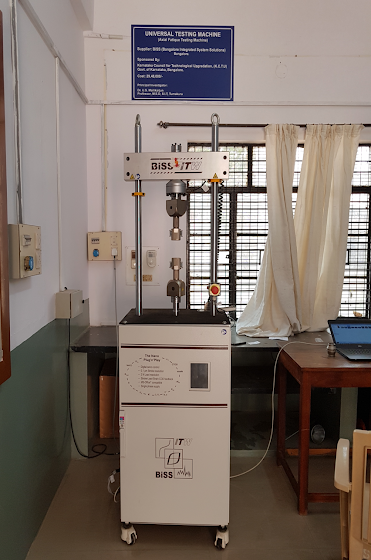 Axial Fatigue Testing Machine |
Specification:
Purpose:
|
| Computerized Universal Testing Machine with furnace attachment for high temperature testing | |
|---|---|
|
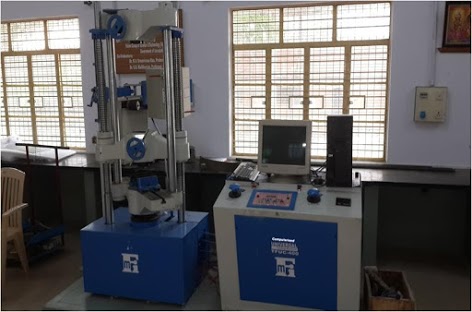 Computerised UTM |
| Spark Emission Spectrometer | |
|---|---|
Specification: (Model – M1008i )
|
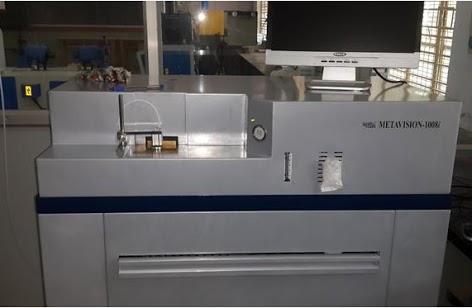 Spark Emission Spectrometer |
| Atomic Absorption Spectrometer | |
|---|---|
 Atomic Absorption Spectrometer |
Specification:
|
| X-Ray Diffraction(XRD) | |
|---|---|
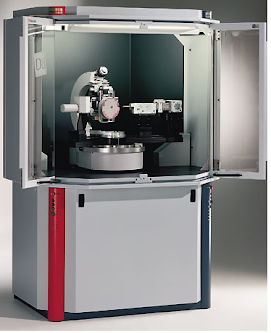 X-Ray Diffraction(XRD) |
Specification:
|
| Fourier Transform Infrared Spectroscopy (FTIR) | |
|---|---|
Specification:
|
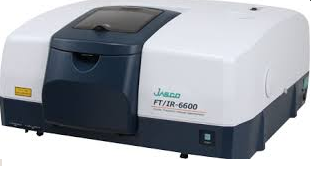 Fourier Transform Infrared Spectroscope |
| Micro Hardness Testing Machine(Vickers, Brinell & Rockwell) | |
|---|---|
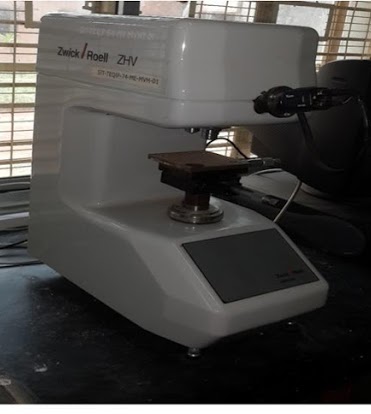 Atomic Absorption Spectrometer |
Specification:
|
| Optical Microscope | |
|---|---|
Specification:
|
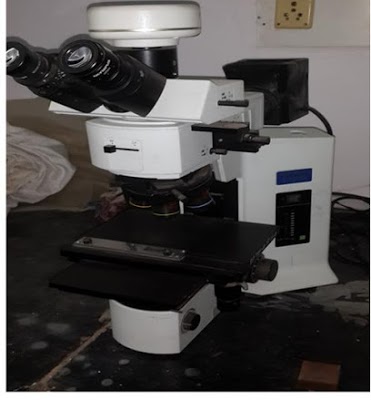 Optical Microscope |
| Metallurgical Microscope with CCD Camera, computer image station | |
|---|---|
Specification:
|
 Metallurgical Microscope |
| Fatigue Testing Machine (Rotational Fatigue) | |
|---|---|
Specification:
|
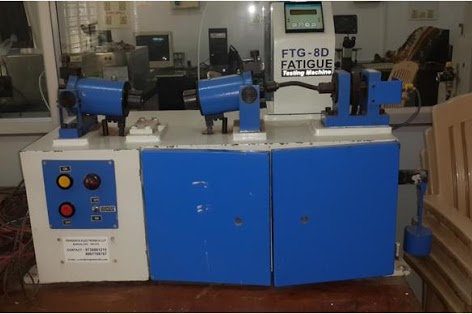 Fatigue Testing Machine |
| Wear Testing Machine(DUCOM) | |
|---|---|
SpecificationLModel No. TR-20LE-PHM-400)
|
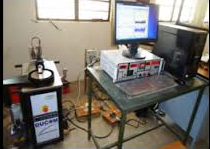 Fatigue Testing Machine |
| Rolling Machine | |
|---|---|
Specification
|
 Rolling Machine |
| Automatic Metallographic Test Sample Preparing Machine | |
|---|---|
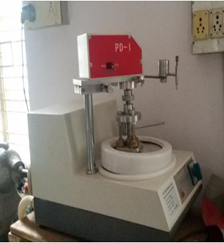 Rolling Machine |
Specification
|
| Automatic Metallographic Test Sample Preparing Machine | |
|---|---|
Specification
|
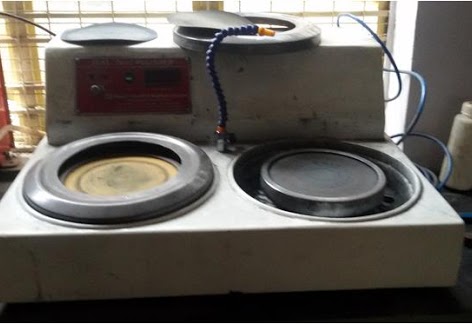 Metallurgical Specimen Polishing Machine |
| 3D Printer (Rapid Prototyping Machine) | |
|---|---|
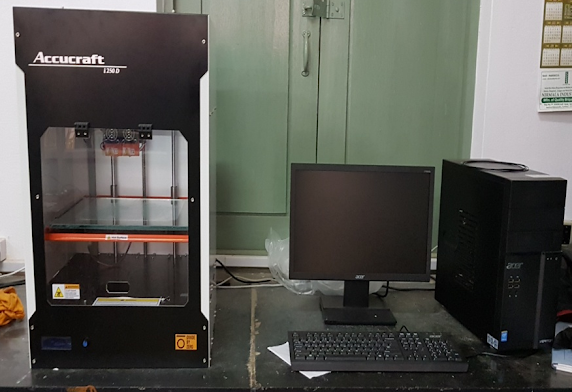 3D Printer (Rapid Prototyping Machine) |
Specification:
Purpose:
|
| CNC Wire Electro Discharge Machine | |
|---|---|
|
Specification:
Purpose:
|
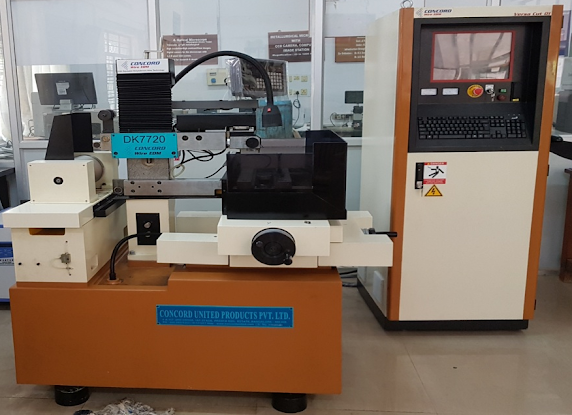 CNC Wire Electro Discharge Machine |
| CNC Milling Machine | |
|---|---|
Specification:
|
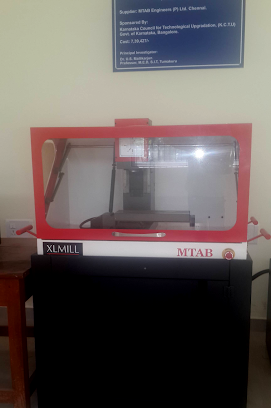 CNC Milling Machine |
| CNC Lathe | |
|---|---|
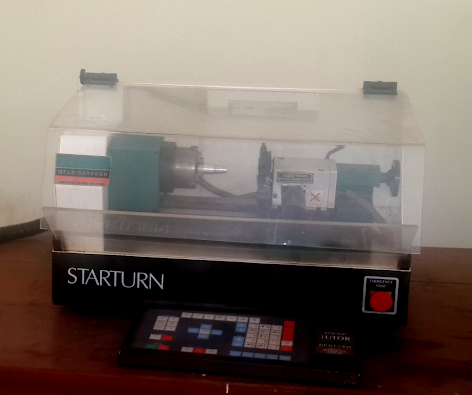 CNC Lathe |
Specification:
|
| Six Axis Articulated Robot | |
|---|---|
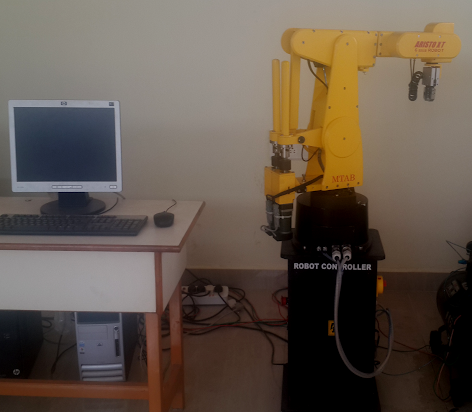 Six Axis Articulated Robot |
Specification:
|
| Induction Furnace | |
|---|---|
| Induction Furnace |
Specification:
Purpose:
|
| Resistance Furnace | |
|---|---|
|
Specification:
Purpose:
|
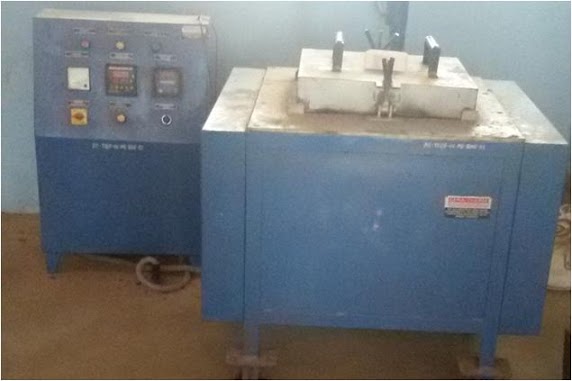 Resistance Furnace |
| Muffle Furnace | |
|---|---|
Specification:
|
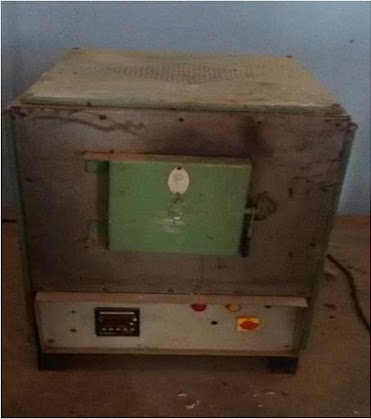 Muffle Furnace |
| Electric oven | |
|---|---|
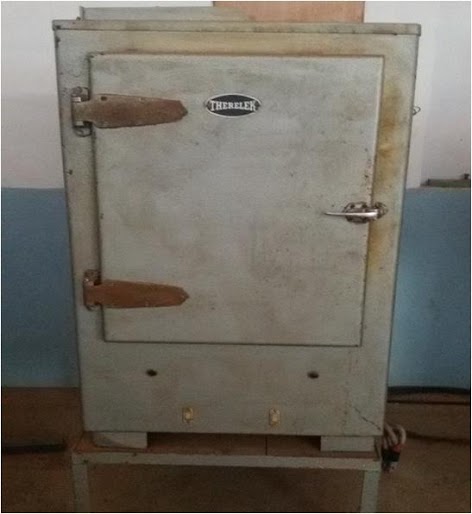 Electric oven |
Specification:
|
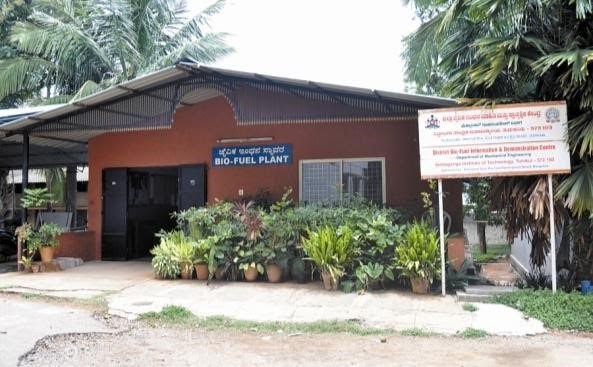
| Bio Energy Research, Information and Demonstration Centre |
|---|
| |
|
District Biofuel Research and Information Centre, Mechanical Engineering Department was inaugurated by Dr.Sri Sri Sri Shivakumara Swamiji on 10th August 2011. District Biofuel Information and Demonstration Centre, is a funded project by Karnataka State Bioenergy Development Board (KSBDB) managed by Ministry of Rural Development and Panchayat Raj. Biofuel I & D Centre is creating awareness by conducting training programme for the development and maintenances of Non-Edible oil seed plants. KSBDB is funding to conduct 25 awareness programmes every year. Farmers, NGO’s and rural school children’s are educated about the importance of the Non-Edible oil seed plants. Farmers are supported to grow the non-edible seed pants on the bunds and barren land by utilising the programmes like Baradu Bangara and suvarnabhoomi schemes. Information and Demonstration Centre,Siddaganga Institute of Technology is producing 50 litres of Biodiesel per day. Produced biodiesel is utilised in college DC generators and vehicles and its performances is studied regularly. This programme is supporting UG, PG and P.hD scholars for doing research work. Students and research scholars have published research papers on development and characterization of biodiesel from different species. |
|
Karnataka State Council for Science and Technology is funding biofuel projects regularly under SPP programme. This programme is carried out in collaboration with Mechanical, Chemical, Biotechnology and Chemistry Departments. I & D centre is also supporting KSRTC, IIT Madras, Krishi Vignana Kendra and other Engineering colleges in Karnataka State for carryout the research projects. |
| Dr. R Suresh |
|---|
|
Professor & Coordinator BRID centre Mechanical Engineering Department SIT, Tumakuru. +91 9448656519 suresh_tumin@yahoo.com |
| Gallery | |
|---|---|
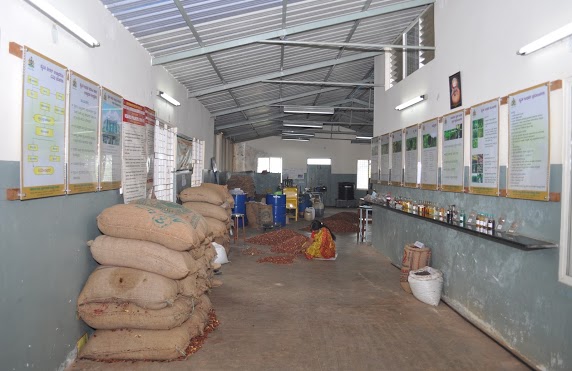
|
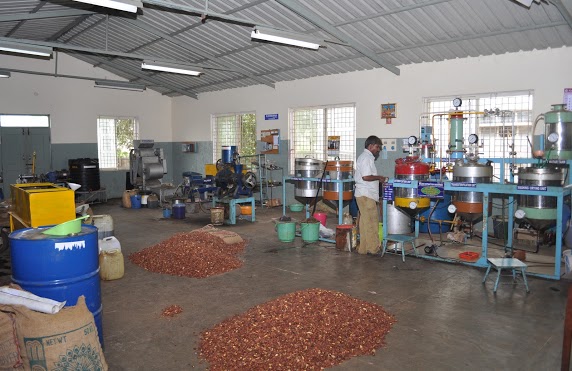
|
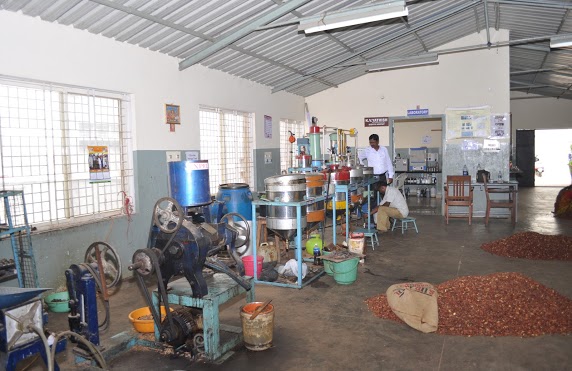
|
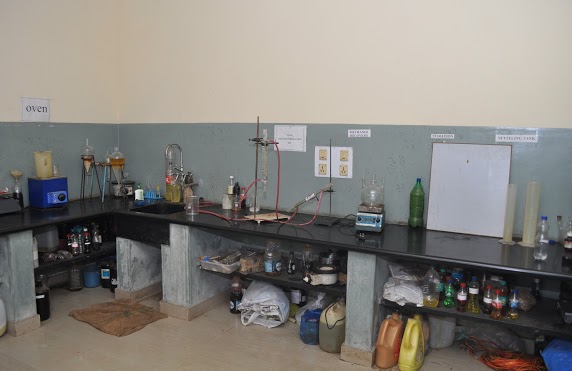
|
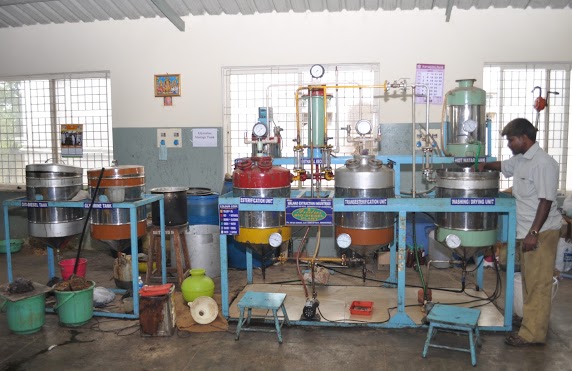
|
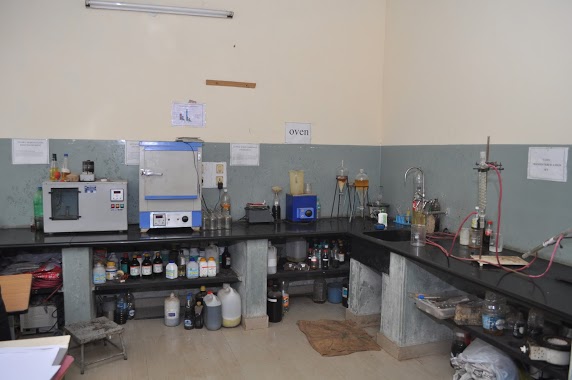
|
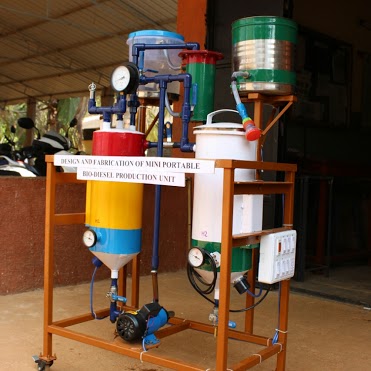
|
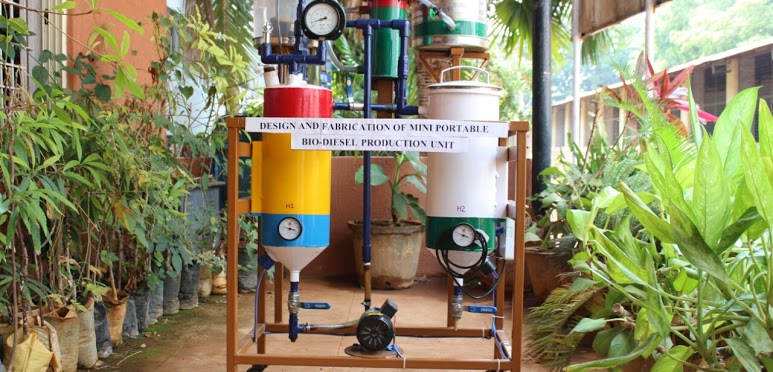
|
| . | |
|---|---|
| Dr. M G Gautham | |
| Assistant Proffessor | |
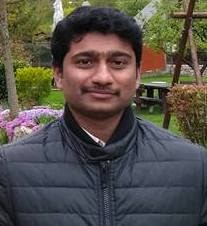
|
Assistant Professor Ph.D. gauthammg@sit.ac.in +91 9740771357 Profile: |
|
|
|
|---|
| ( ! ) Notice: Undefined variable: resgetassprofinfo in C:\wamp64\www\sit\html\component\placementdepartmentfacultyprofile.php on line 197 | ||||
|---|---|---|---|---|
| Call Stack | ||||
| # | Time | Memory | Function | Location |
| 1 | 0.0002 | 360824 | {main}( ) | ...\department.php:0 |
| 2 | 0.5754 | 738240 | include( 'C:\wamp64\www\sit\html\component\placementdepartmentfacultyprofile.php ) | ...\department.php:1352 |
| ( ! ) Warning: mysqli_fetch_assoc() expects parameter 1 to be mysqli_result, null given in C:\wamp64\www\sit\html\component\placementdepartmentfacultyprofile.php on line 197 | ||||
|---|---|---|---|---|
| Call Stack | ||||
| # | Time | Memory | Function | Location |
| 1 | 0.0002 | 360824 | {main}( ) | ...\department.php:0 |
| 2 | 0.5754 | 738240 | include( 'C:\wamp64\www\sit\html\component\placementdepartmentfacultyprofile.php ) | ...\department.php:1352 |
| 3 | 0.5770 | 839128 | mysqli_fetch_assoc( $result = NULL ) | ...\placementdepartmentfacultyprofile.php:197 |
| ( ! ) Notice: Undefined variable: resgetvisifacultyfinfo in C:\wamp64\www\sit\html\component\placementdepartmentfacultyprofile.php on line 345 | ||||
|---|---|---|---|---|
| Call Stack | ||||
| # | Time | Memory | Function | Location |
| 1 | 0.0002 | 360824 | {main}( ) | ...\department.php:0 |
| 2 | 0.5754 | 738240 | include( 'C:\wamp64\www\sit\html\component\placementdepartmentfacultyprofile.php ) | ...\department.php:1352 |
| ( ! ) Warning: mysqli_fetch_assoc() expects parameter 1 to be mysqli_result, null given in C:\wamp64\www\sit\html\component\placementdepartmentfacultyprofile.php on line 345 | ||||
|---|---|---|---|---|
| Call Stack | ||||
| # | Time | Memory | Function | Location |
| 1 | 0.0002 | 360824 | {main}( ) | ...\department.php:0 |
| 2 | 0.5754 | 738240 | include( 'C:\wamp64\www\sit\html\component\placementdepartmentfacultyprofile.php ) | ...\department.php:1352 |
| 3 | 0.5777 | 839128 | mysqli_fetch_assoc( $result = NULL ) | ...\placementdepartmentfacultyprofile.php:345 |
|
|
|
|---|
| . | |
|---|---|
| Dr. Virupaxi Auradi | |
| Assistant Proffessor | |
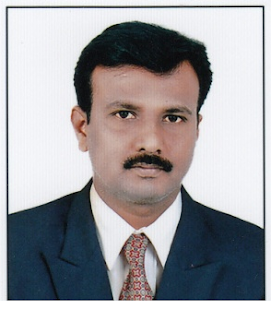
|
Professor & Head M.Tech., Ph.D. vsauradi@sit.ac.in +91 9844386037 Weblink: Profile: |
| . | |
|---|---|
| Dr. U S Mallikarjun | |
| Assistant Proffessor | |
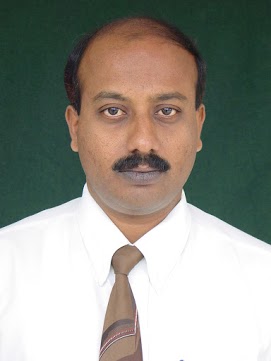
|
Professor M.Tech., Ph.D usm@sit.ac.in +91 9448166621 Profile: |
| . | |
|---|---|
| Dr. H C Madhu | |
| Assistant Proffessor | |
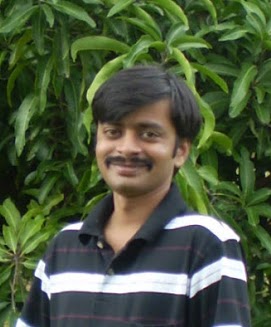
|
Assistant Professor Ph.D. hcmadhu@sit.ac.in +91 9611270525 Weblink: Profile: |
| . | |
|---|---|
| Dr. M G Gautham | |
| Assistant Proffessor | |

|
Assistant Professor Ph.D. gauthammg@sit.ac.in +91 9740771357 Profile: |
| . | |
|---|---|
| B C Suresh | |
| Assistant Proffessor | |
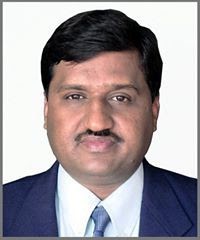
|
Associate Professor M.Tech. bcs@sit.ac.in +91 9900575337 Weblink: Profile: |
| . | |
|---|---|
| Dr. Shivashankar H S | |
| Assistant Proffessor | |
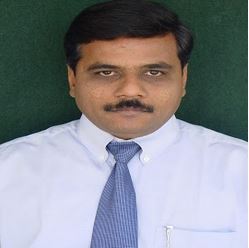
|
Associate Professor M.Tech., Ph.D. hssmed@sit.ac.in +91 9901245082 Profile: |
| Chairman |
|---|
|
Dr. U S Mallikarjun Professor and Head Department of Mechanical Engineering, SIT,Tumakuru - 572103. |
| Members | |||
|---|---|---|---|
|
Mr. Prashanth Doreswamy President & CEO Continental India Bengaluru, Karnataka |
Dr. Nagahanumaiah DirectorCMTI Bengaluru, Karnataka |
Mr. Nagakumar Director, Fitwel Tools & Forgings Pvt. Ltd. Antharasanahalli Industrial Area Tumkur, Karnataka |
|
|
Mr. B V A Patnaik Distinguish Scientist H Materials & Structures lab GTRE, Bengaluru |
Dr. Sathish kumar VP & Head Business Development Sansera AerospacePune, Maharashtra |
Mr. G. B. Ravi GM, Digital Machining – S&E Asia Sandvik Cormant India Pvt. Ltd.Pune, Maharastra |
|
|
Dr. P. Chakravarthy Profesor, Aerspspace Engineering, IIST ThiruvananthapuramKerala |
Dr. J. M. Mallikarjuna Professor, Department of Mechanical Engineering, IIT MadrasChennai |
||
| Rachana |
|---|
| The cultural festival organized at the Department level annually helps to develop the interaction between students of all the batches. On spot events like Formal -design oriented, Informal - Interactive and personality based and casual events are conducted to nurture the overall development of the students. Successful Practicing Architect from the field will be the chief guest for the event who shares their professional experience to motivate the students. |
| Annual Exhibition |
| Exhibition of the academic works of students during the previous year is organized at the Department annually. During this event, outstanding works of students are recognized with a certificate of appreciation. |
| Seminars |
| Eminent Architects with experience in various architectural genres are regularly invited for Guest Lecture and Seminars to the students at the at the Department level. Students get ample opportunity to interact with the filed experts. |
| ( ! ) Warning: include(./component/coadept/coaresearch.php): failed to open stream: No such file or directory in C:\wamp64\www\sit\html\department.php on line 1546 | ||||
|---|---|---|---|---|
| Call Stack | ||||
| # | Time | Memory | Function | Location |
| 1 | 0.0002 | 360824 | {main}( ) | ...\department.php:0 |
| ( ! ) Warning: include(): Failed opening './component/coadept/coaresearch.php' for inclusion (include_path='.;C:\php\pear') in C:\wamp64\www\sit\html\department.php on line 1546 | ||||
|---|---|---|---|---|
| Call Stack | ||||
| # | Time | Memory | Function | Location |
| 1 | 0.0002 | 360824 | {main}( ) | ...\department.php:0 |
| ( ! ) Warning: include(./component/coadept/coaacademics.php): failed to open stream: No such file or directory in C:\wamp64\www\sit\html\department.php on line 1562 | ||||
|---|---|---|---|---|
| Call Stack | ||||
| # | Time | Memory | Function | Location |
| 1 | 0.0002 | 360824 | {main}( ) | ...\department.php:0 |
| ( ! ) Warning: include(): Failed opening './component/coadept/coaacademics.php' for inclusion (include_path='.;C:\php\pear') in C:\wamp64\www\sit\html\department.php on line 1562 | ||||
|---|---|---|---|---|
| Call Stack | ||||
| # | Time | Memory | Function | Location |
| 1 | 0.0002 | 360824 | {main}( ) | ...\department.php:0 |
| ( ! ) Warning: include(./component/coadept/coacolloborations.php): failed to open stream: No such file or directory in C:\wamp64\www\sit\html\department.php on line 1579 | ||||
|---|---|---|---|---|
| Call Stack | ||||
| # | Time | Memory | Function | Location |
| 1 | 0.0002 | 360824 | {main}( ) | ...\department.php:0 |
| ( ! ) Warning: include(): Failed opening './component/coadept/coacolloborations.php' for inclusion (include_path='.;C:\php\pear') in C:\wamp64\www\sit\html\department.php on line 1579 | ||||
|---|---|---|---|---|
| Call Stack | ||||
| # | Time | Memory | Function | Location |
| 1 | 0.0002 | 360824 | {main}( ) | ...\department.php:0 |
| Faculty Development Workshop Series |
|---|
|
Faculty Development Programme
|
| Special Lectures Organised in the Chemical Engineering Department |
|---|
|
Special Lecture
|
|
The department is recognized as research centre by VTU to offer MSc (Engg) and Ph.D. degrees. |
|---|
| Areas of Research |
|---|
|
| Research Groups |
|---|
|
| Civil Consultancy Work |
|---|
|
| Consultancy Details |
|---|
|
| Project Report Guidelines Documents |
|---|
|
Students are informed to submit project report copy each to the concerned guide, project co-ordinator and department library and retain a copy with them. Major project report shall be hard binded (Gray color) and mini project report shall be spiral binded (transparent sheet in front and gray color sheet in back). |
|
Guidelines to prepare UG Project Report |
| Project Evaluation Sheet |
|
Major Project Evaluation Format |
The objective of COSMOS is to spread awareness about Free and Open Source Software (FOSS) among the students and leverage the power of FOSS to enhance the technical skills of students and mentored by Free Software Movement Karnataka. Several technical events and workshops are organized under this chapter Activities conducted under COSMOS are:
- One-day workshop on "how to build Virtual Reality enabled Web applications
- Hands on workshop on "how to use Git - a Distributed Version Control System
- 24-hour Hackathon
- Workshop on "how to build block chains and write smart contracts using the Ethereum platform
- Free Software Introduction Session - 1st September 2017
- Mozilla Web VR Camp - 7th October 2017
- Git Workshop - 8th March 2018
- Workshop on Block Chain and Ethereum by Mozilla Reps- 25thAugust 2018
- HackFest - 29thand 30th September 2018
Computer Society of India (CSI) student chapter was started at SIT during September 2011. All students of departments of CSE, ISE and MCA are members of this chapter.
Benefits and Advantages to CSI Student members
| Recognition: | ||||||||||||
|---|---|---|---|---|---|---|---|---|---|---|---|---|
|
||||||||||||
| Knowledge Enhancement: | ||||||||||||
|
||||||||||||
| CSI Publication: | ||||||||||||
|
||||||||||||
| Awards: | ||||||||||||
|
||||||||||||
| Networking: | ||||||||||||
|
||||||||||||
| Every academic year following activities are conducted under SIT-CSI chapter |
||||||||||||
| 1. CSI concentrics: | ||||||||||||
|
Following co-curricular activities are conducted: a. Debate b. Innovative project demonstration c. Pick and speak d. Online treasure hunt e. Application development f. Group discussion g. Hobby project demonstration |
||||||||||||
| 2. CSI Hackathon: | ||||||||||||
|
The objectives of hackathon are promoting creativity, collaboration, and innovative thinking.
Here students come up with novel solutions to particular problems, innovative ideas and
prototypes regarding new business opportunities. Hackathon is technology-driven and primarily
about software. It requires not only great technical and coding skills but also ideation and
presentation skills. Twelve hour or twenty-four-hour hackathon is conducted every
year. |
||||||||||||
| Activities organized under SIT - CSI student chapter for inter institute participants in last three years: | ||||||||||||
|
| DeCoders the programming club of SIT is a club which functions under the incubation of the
Computer Science Department and every event conducted by DeCoders is directly or indirectly
intended to the betterment of the department. DeCoders mainly is a group of like-minded people
who have a nag for coding or developing technical solutions to challenging problems. Over the
past five years the club has conducted many technical events, seminars etc. The final year
members of the team frequently take sessions on programming mostly focusing on algorithmic
designs for their fellow team members. These sessions are not only restricted to the members of
DeCoders but anyone in the college willing to learn these things are always welcomed. DeCoders
also helps its members in developing new projects. The team generally takes a project and
members from all the years work on it to complete the project. This gives the members an
exposure to the product development environment and also helps them with their resume. Activities conducted under DeCoders club:
|
| S I G M A |
|---|
| Sigma is the newsletter of Computer Science and engineering department. It was started in the year of
2001. Team sigma was created to provide the students with updates and information about the latest
trends and technology in the domain of computer science.Sigma currently consists of 24 members. The
basic idea to form this group was to incorporate any upcoming or latest technology at one place and make
the students aware of all information and technology which is worth knowing for any student of a
computer science background.
Sigma team also conducts fun and interactive events for students for all years and all branches. It conducts a technical article writing contest for the students each year ,from which three write ups will be selected and published in the edition and will be awarded with cash prizes. |
| SECTIONS IN SIGMA |
Every edition includes different sections designed to provide specific information. They are:
|
| Recent Sigma Editions |
|
Sigma-2023 News Letter Sigma-2022 News Letter Sigma-2020 News Letter Sigma-2019 News Letter Sigma-2018 News Letter Sigma-2017 News Letter Sigma-2016 News Letter |
|
Hobby projects / Apps developed by the students |
| Click Here |
- volunteer and organize the events
- participate and showcase their research work
- work in teams
- communicate and collaborate with the students of other colleges
- get awareness of the outside world
- interact with the judges from other esteemed organizations
The following co-curricular and extra-curricular events are organized in BROWSE.
- Prasthuti (technical paper presentation)
- MindSnare (technical quiz)
- Life Extension (Gaming contest)
- Cyber Etymology (technical crossword)
- Byte Surge (programming contest)
- Photo Hunt (treasure hunt)
The conference was inaugurated on 15th December 2017 by Dr. S S Iyengar, Ryder Professor and Director, School of Computing and Information Sciences, Florida International University, Miami, USA. During his inaugural address, he stressed on India becoming developed country and expressed the need for interdisciplinary research quoting examples in the domain of medical and naval applications. He expressed his concern over Indian scientists not in the list of Nobel Laureates in the recent years, and appreciated that Bangalore is identified as a Global Information Technology hub. He urged all the participants to think of interdisciplinary problems and come up with novel solutions useful to society. He also listed domains like Artificial Intelligence, Cloud Computing, Forensic Analysis, Data Fusion, Image Processing, Internet of Things, Pattern Recognition which the researchers can choose, work and make India great.
Sri Srinivas Ramanujam, Academic Relationship Manager, Tata Consultancy Services, Bengaluru, expressed that talent in all the institutions requires to be nurtured for the progress of the country. Sri Bindu Madhava B S, Associate Director, Real Time Systems and Smart Grid, CDAC, Bengaluru, during his address highlighted the top ten technologies identified by IEEE for the year 2018.
Dr. M N Channabasappa, Director, SIT, Tumakuru presided over the function and addressed the gathering about the importance of presenting technical papers in international conferences. Dr. Shivakumaraiah, Principal, SIT, expressed that interdisciplinary conferences need to be organized which will initiate the collaborative research work across the departments.
Dr. R Sumathi, Head of the Department of Computer Science and Engineering., Dr. R Aparna, Head of the Department of Information Science and Engineering. Dr. N R Sunitha, Professor in Department of Computer science and Engineering. were present during the function.
Renowned technologists from academia and industry have delivered keynote address on the latest developments in the field of computation and information technologies. Dr. Rajan M A from TCS spoke on "Block Chain Technology and its Applications", Dr. S S Iyengar delivered a keynote address on "Artificial Intelligence and Deep learning in Software Development" and Dr. Athithan G from DRDO addressed R&D challenges in cyber security during his keynote talk. The key note address on 15th and 16th was followed by paper presentation sessions. About 50 researchers all over India presented their research work in the areas of computing, database, networking and security. All the accepted and presented papers will be published in IEEE Explorer.
| Student Chapters |
|---|
| Details of Institutional Chapters and activities under it International Society of Automation |
| 1. Year of starting the section in the department-2001 2. Name of the Faculty advisor-Dr.H.M Kalpana 3. Number of student members for the academic year 2018--43 |
| The International Society of Automation (www.isa.org) is a nonprofit professional association that sets the standard for those who apply engineering and technology to improve the management, safety, and cyber security of modern automation and control systems used across industry and critical infrastructure. Founded in 1945, ISA develops widely used global standards; certifies industry professionals; provides education and training; pubtdshes books and technical articles; hosts conferences and exhibits; and provides networking and career development programs for its 40,000 members and 400,000 customers around the world. ISA owns Automation.com, a leading ontdne pubtdsher of automation-related content, and is the founding sponsor of The Automation Federation (www.automationfederation.org), an association of non-profit organizations serving as "The Voice of Automation." Through a wholly owned subsidiary, ISA bridges the gap between standards and their implementation with the ISA Security Comptdance Institute (www.isasecure.org) and the ISA Wireless Comptdance Institute (www.isa100wci.org). |
| Activities conducted under the above chapter during 2017-18 National Symposium - iACT 2018 conducted on 25.02.2018 Technical Quiz, Paper Presentation, Robo Rash and Project Exhibition competitions were conducted and 95 students from nine colleges in and around Karnataka were participated. |
| Exhibited the Project "Attendant Robot for Bed Ridden Patients" in the Project Exhibition Anveshana organized by Agasthya Foundations and Synopsis, Bangalore and National Science day exhibition organized by KSCST, held at IISc, Bangalore. |
| IEEE ENGINEERING IN MEDICINE AND BIOLOGY SOCIETY (IEEE-EMBS)TUMAKURU STUDENT CHAPTER. |
| ACTIVITIES: Visit arranged to NIMHANS Bangalore on the occasion of National Science day which observed the display of various Biomedical instruments. A guest Lecture was arranged by Dr.N Sriram, Professor & Head, Department of Medical Electronics, MSRIT, Bangalore on thy topic 'Engineering in Medicine and biology: Scope and Challenges. |
| Students Activities |
|---|
| Activity Detail |
| Innovative method adapted |
|---|
| Usage of ICT tools |
| Invited Special Lectures Delivered In The Department By The Scholars (FROM 1.4.2010 TO 31.3.2011) |
|---|
| Invited Special Lectures |
| List of Bridge courses conducted |
|---|
| List of Bridge courses |
| Name of the laboratory | Equipments available |
|---|---|
| Digital Electronics and Circuits Laboratory |
image |
| Digital Signal Processing Laboratory |
image |
| Electronic Devices and Circuit\DCCS Laboratory |
image |
| Embedded System Laboratory |
image |
| Linear Integrated Circuits Laboratory |
image |
| M.Tech Lab |
image |
| Process Automation Labouratory |
image image |
| Process Instrumentation Labouratory |
image |
| Thin Film Research Centre |
image image image |
| Project lab |
image image |
| VHDL Laboratory |
image |
Digital Electronics and Circuits Laboratory
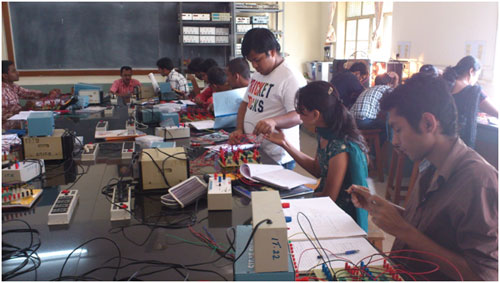
Digital Signal Processing Laboratory
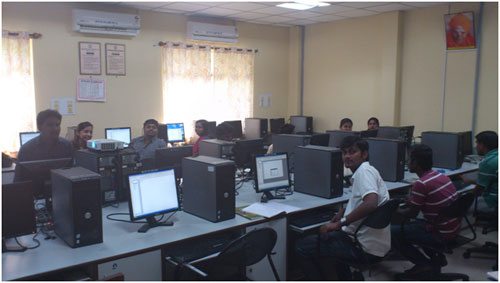
Electronic Devices and Circuit\DCCS Laboratory
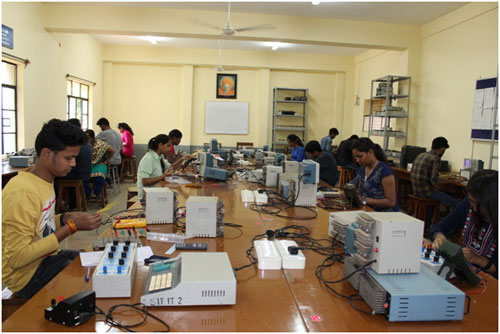
Embedded System Laboratory
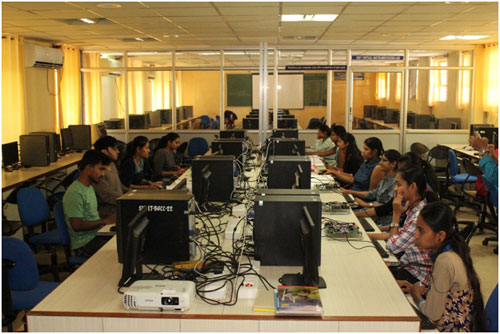
Linear Integrated Circuits Laboratory
M.Tech Laboratory
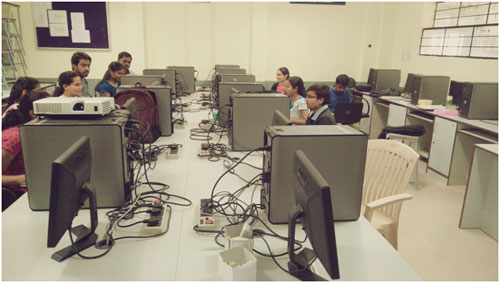
Process Automation Labouratory
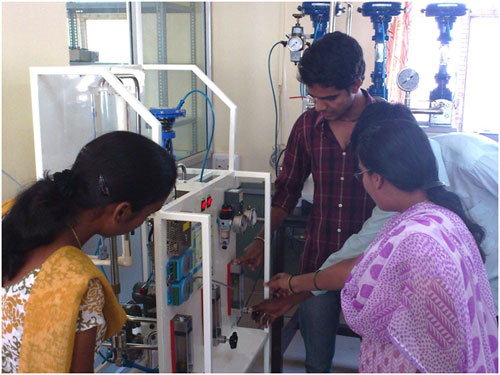
Process Instrumentation Labouratory
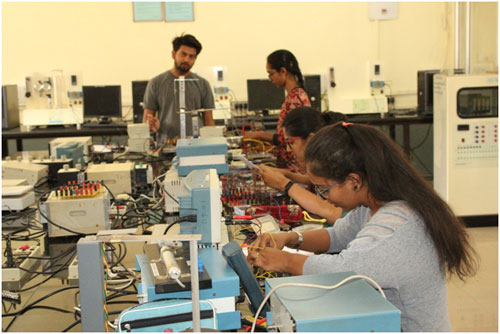
Thin Film Research Centre
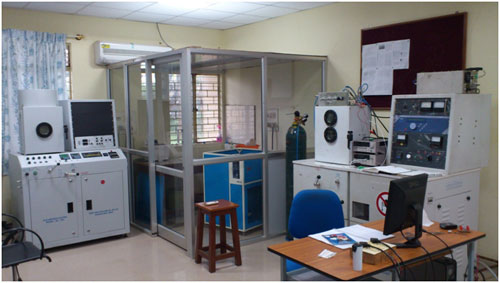
Thin Film Research Centre
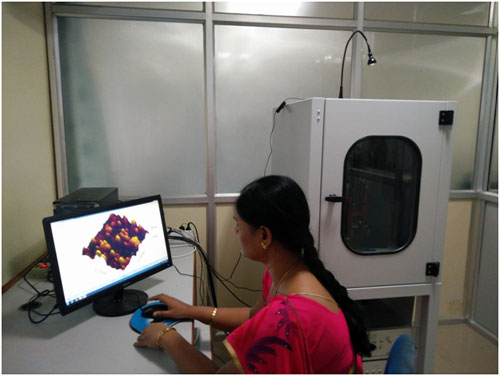
Thin Film Research Centre
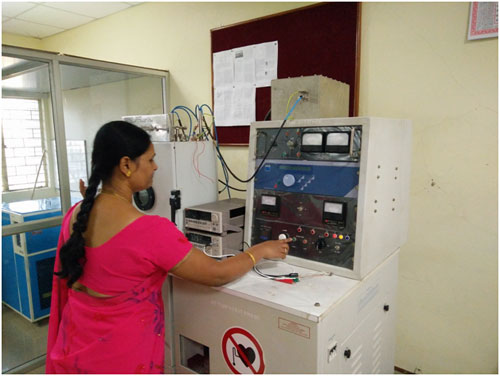
Thin Film Research Centre
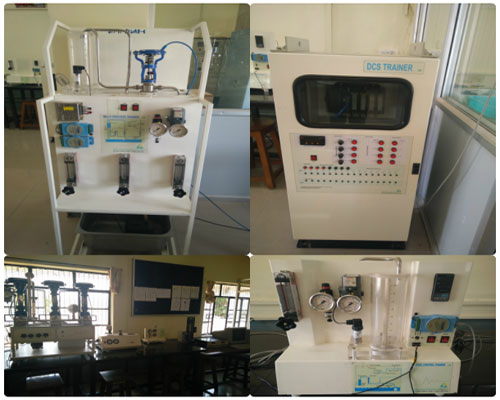
Project Laboratory
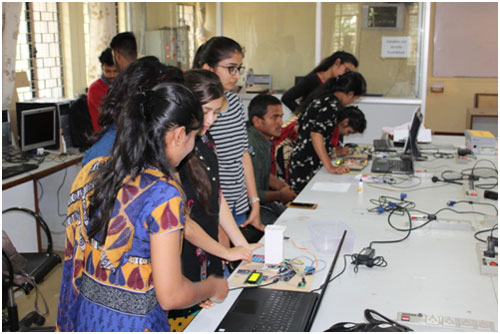
Project Laboratory

VHDL Laboratory
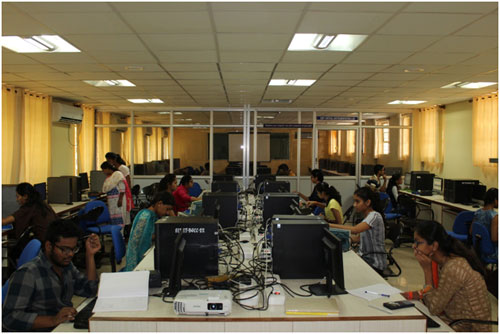
| Project Details |
|---|
| Best Mini-Project and Major-Project Detail |
| Student Funded Projects |
|---|
| Student Funded Projects |
|
Proctor Students List-2024-2025 Proctor Students List-2022-2023 Proctor Students List-2021-2022 Proctor Students List-2020-2021 Proctor Students List-2019-2020 |
| Year | Student Name | USN |
|---|---|---|
| 2011 | Umang Kotriwal | 1SI07IS055 |
| 2012 | AkanchaSinha | 1SI08IS001 |
| 2013 | Mithesh Kumar | 1SI09IS021 |
| 2014 | Vanitha H | 1SI10IS056 |
| 2015 | Deepu H N | 1SI11IS018 |
| 2016 | Preetham G | 1SI12IS030 |
| 2017 | Kajol R | 1SI13IS023 |
| 2018 | Sindhupriya M A | 1SI14IS048 |
 |
|
Auto Architects is the All Terrain Vehicle Design and fabrication team of Siddaganga Institute of Technology, Tumakuru. The team has been working under the guidance of Dr.Umashankar since 2008, and has participated in various ATV Design and Design Innovation contests across the country and recognized by various organizations and conglomerates. In 2010, Auto Architects participated for the first time in BAJA SAE INDIA, held at Pithampur, Madhya Pradesh and secured 38th position across India.In 2012 stood 37th among 180 teams. Adding to the journey in 2016 the team cleared all the technical tests and successfully ran the vehicle in the endurance event. Presenty the team is working under |
|
Faculty Advisors : Mr. Guruchannabasavaiah and Mr. Naresh Captain : Prateek Pallav, Vice Captain : Saket Raj This year the team has cleared Virtual round for BAJA SAE India 2018,and secured 34th position all over India among 389 teams and 3rd in Karnataka. Determined and passionate students are fabricating the buggy for dynamic round with the vision to be the best i.e. Main BAJA SAE INDIA which is scheduled in January / February 2018. Click here to follow us on Instagarm A team of automobile enthusiasts from SIT,Tumkur, designing & fabricating ATVs for BAJA SAE. Affiliation Society of Automotive Engineers, India(SAE India), BAJA SAE INDIA, SIT SAE COLLEGIATE CLUB, Siddaganaga Institute of Technology, Tumakuru. |
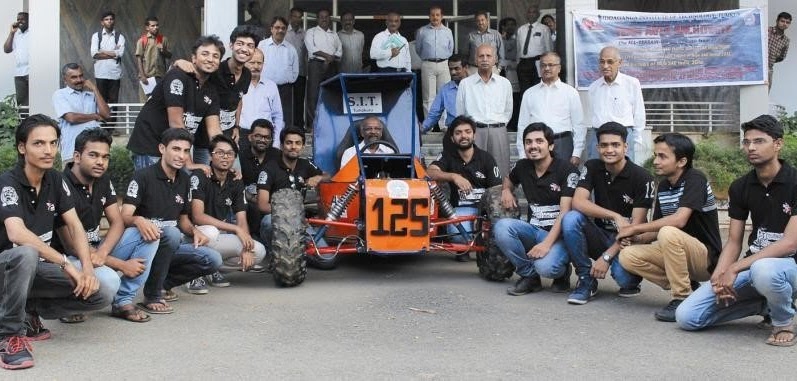 |
 |
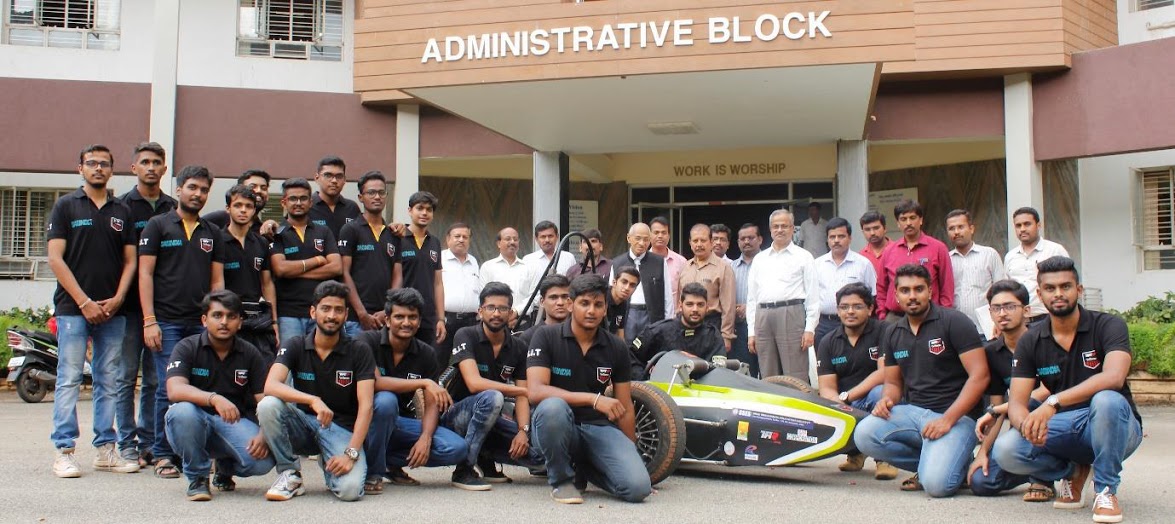 |
|
Team Adrenaline Racing history began in the year 2010, since then the team members have worked hard to evolve and create a stronger presence at competitions every year. Team’s main goal is to improve the performance and achieve better results and it believes that there is always room for improvement and do whatever to accomplish thee mission. The team consist of 25 students guided by our faculties, worked together and successfully fabricated open wheeled Formula Racing Car. It started and completed designing process of the 6th car in the month of December, 2017. Fabrication was soon started in January,2018 and it was able to finish it in the month of March, 2018. Testing and setting up of the car was done during the month of April, 2018. The team participated in SUPRA SAEINDIA 2018 which was held in Buddh International Circuit, Greater Noida from 11th June to 16th June 2018 and secured 3rd rank in Karnataka and 42nd rank out of 126 teams in India. We were able to achieve it under the guidance of Dr. H Shivashankar, Associate Professor, Mr. Ekanthappa J, Assistant Professor and Mr. Omkaresh B R, Assistant Professor. Contact: teamadrenalineracing2015[at]gmail.com The team has received lots of appreciation in the design that was presented at the event. |
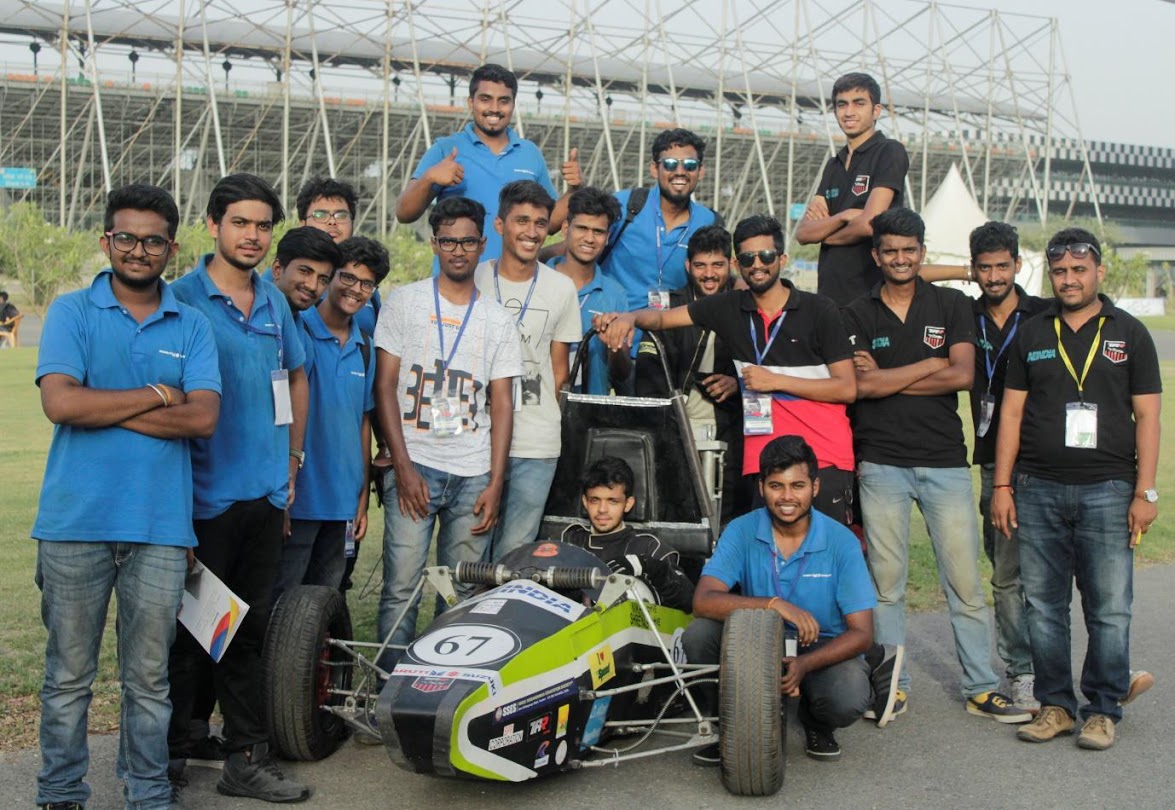 Team members: Amit Kumar, Nikhil Shenoi, Shreyas S, Rishabh Srivastava, Shaurya Prasad Shahi, Goutham Shenoy M, Musthafeez Muheeb Ahmed, Mohammed Zabiulla, Mohith N Kumar, Pavan S N, Manikanta Gowda B, Kumar Swamy H S, Manu L, Pranav K S, Abhinav S, Sai Tarun B V, Sohan K, Mrinal Raj, Aniket Singh. |
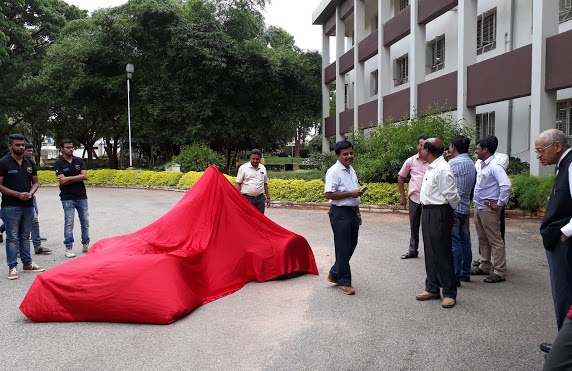 |
 |
 |
|
Soaring Eagles is the aero design team of Siddaganga Institute of Technology, Tumakuru built with passion for aircrafts and Aero-Modeling. The team has participated in various aero design and design innovations contests, both nationally and internationally and recognized by various organizations and conglomerates. The team is completely committed towards the development of aerial vehicles and soar greater heights as the tagline goes “SOAR HIGH”. The basic motto of the team is to generate interest among the students to fabricate, innovate and develop aircraft model and analyze them to get a hands on experience of the technology advancements of this era. Initially started with radio controlled aircrafts, the team now is also doing work in the field of multirotors, hovercrafts and water rockets. Every year the team recruits new members, mostly from first and second year of engineering of all the branches, who have a keen interest in this wonderful field of Aeronautics and Aerodynamics. Dr. Shivasiddaramaiah A G, Assistant Professor, Mechanical Engineering Department, guides the team and motivates it to always come up with new innovative ideas and achieve greater success as the faculty advisor. Some of the achievements of the team are:
|
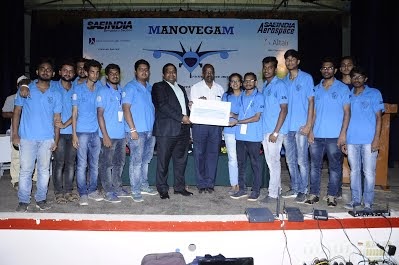 |
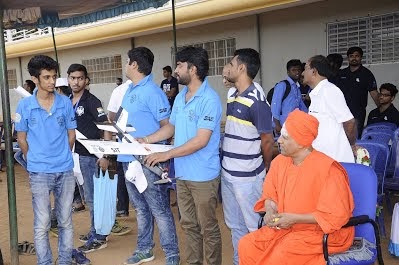 |
 |
|
FIRING PISTON Firing piston is the Go-kart Vehicle Design and fabrication team of Siddaganga Institute of Technology, Tumakuru. The team has been working under the guidance of Mr. Vijaykumar Hiremath since 2018 and has participated in various Go-kart Design and Design Innovation contests across the country and recognized by various organizations and conglomerates. In 2015, the team named as “Team Dragon Racing”, participated for the first time in “Indian Karting League” (Vayuputhra motorsports) held in Bangalore and has secured 6th position in the competition. In 2018 this team, reinitiated as “FIRING PISTON”, took part in International Go-kart Championship, LPU, Punjab and stood 33rd among 45 teams. VISION: To apply the concepts of technical knowledge in development of an automobile Presently the team is working under Faculty Advisor: Mr. Vijaykumar Hiremath Founders: Sachin Hosmane S (Ex member of team dragon racing), Arunabha Majumder, Aditya Mohan Naik. Facebook link: click here
|
TEAM INVICTUS Team Invictus is energy efficient human cum electrically powered three wheeled vehicle Design and fabrication team of Siddaganga Institute of Technology, Tumakuru. The basic motto of the team is to generate interest among the students to fabricate, innovate and develop energy efficient vechicles and analyze them to get a hands on experience of the technology advancements of this era. The vehicle must be aerodynamically, highly engineered and ergonomically designed. The team is going to participate in SAE NIS EFFICYCLE, 2018, LPU, Punjab, India. Presently the team is working under Faculty Advisor: Mr. Vijaykumar Hiremath Founders: Sehran Imam, Ritesh Kumar Singh Facebook link: click here |
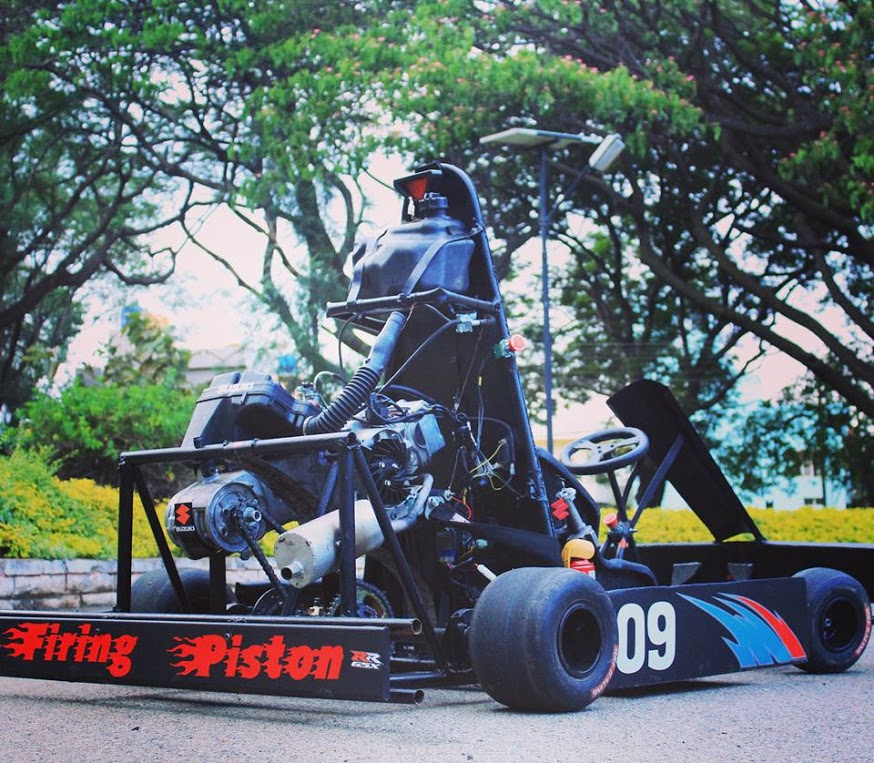 |
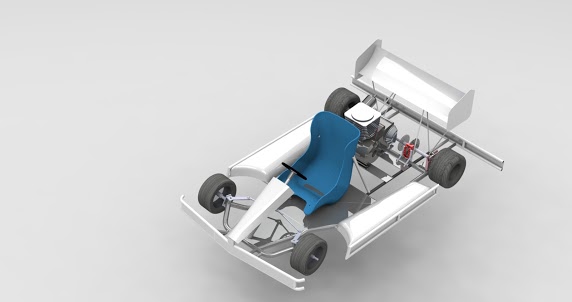 |
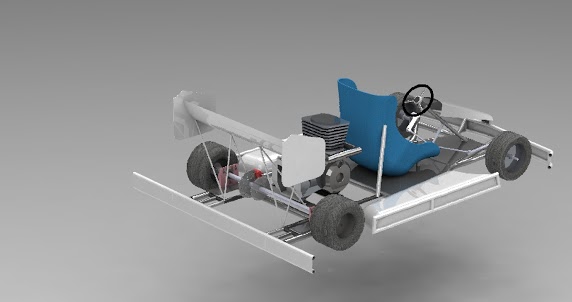 |
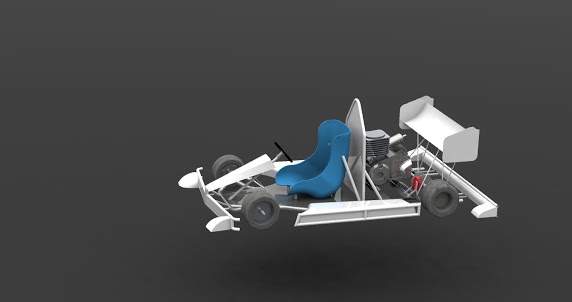 |
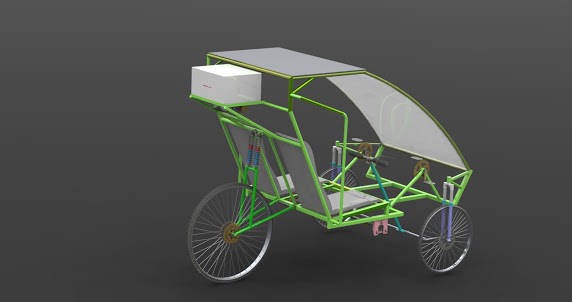 |
|
ISTE Students Chapter of SIT,Organize PROJECT EXHIBITION FOR THE YEAR 2018-19 Siddaganga Institute of Technology, Tumkur is one of the premier engineering institute in INDIA with an NIRF ranking of 79 for the 2019 , organized a project exhibition of final and pre final year engineering students of the institute in association with ISTE Students Chapter of SIT, Tumkur. In this exhibition, Forty five selected projects from all the departments were showcased on a single platform. The exhibition was open for the public and students of high schools and PU colleges of Tumkur. The exhibition was arranged in the basketball court of SIT campus. The exhibition was inaugurated by Dr. Karisiddappa, Vice- Chancellor of VTU, at 11.00 am, on 22nd April .2019. Best project awards were given in the category final and pre final year projects after evaluation of each project by an expert committee comprising two expert academicians. |
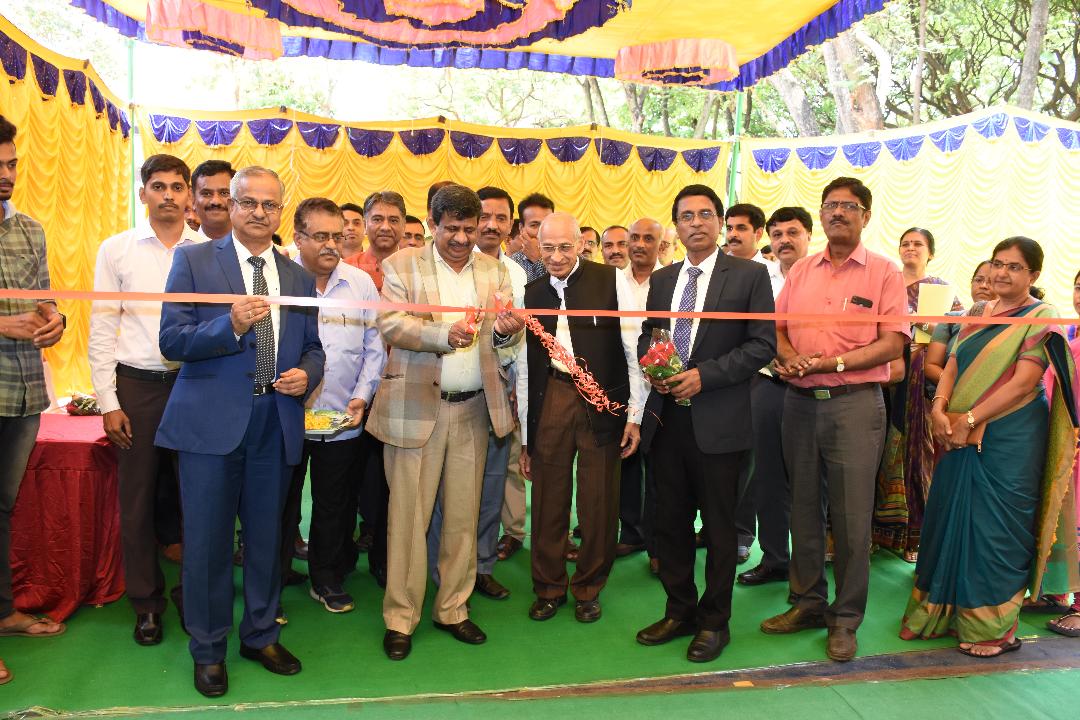 Team members: Amit Kumar, Nikhil Shenoi, Shreyas S, Rishabh Srivastava, Shaurya Prasad Shahi, Goutham Shenoy M, Musthafeez Muheeb Ahmed, Mohammed Zabiulla, Mohith N Kumar, Pavan S N, Manikanta Gowda B, Kumar Swamy H S, Manu L, Pranav K S, Abhinav S, Sai Tarun B V, Sohan K, Mrinal Raj, Aniket Singh. |
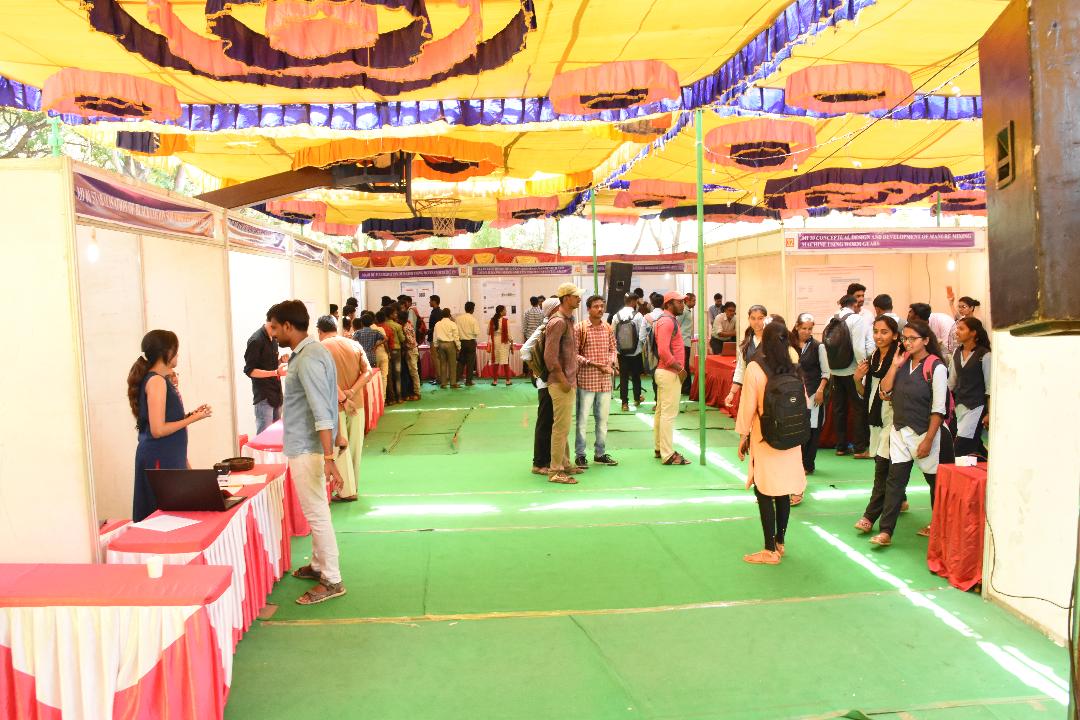 |
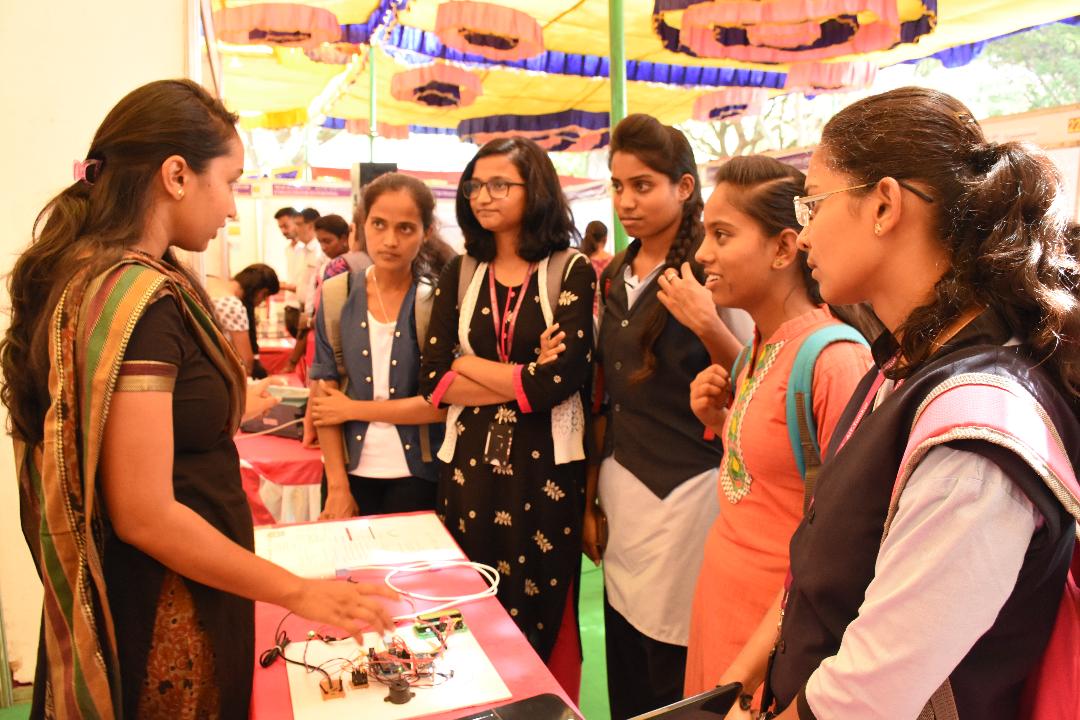 |
Instructional Material
Instructional Material Developed by the departmental faculty members
Dr. K C Narasimhamurthy
| Students Testimonials |
|---|
